What Fucking Equality, that's Bullshit
"see Gloria this is about equality… but we have to leave it like that and not talk."
Cabrera replied, "what fucking equality, that's bullshit"
 ZACATACOS, Chicago - 5925 S Pulaski Rd, West Lawn (SubXNews)
ZACATACOS, Chicago - 5925 S Pulaski Rd, West Lawn (SubXNews)
Two waitresses working at a Mexican restaurant on the southside of Chicago were fired for complaining by text messages about their work schedules during the height of the COVID Pandemic lockdowns in the Spring of 2020.
The National Labor Relations Board (NLRB) found that the employer violated the workers' rights to protected activity when it fired the two workers. An interesting twist was using a secret video recording to show the supervisor lied and was not a credible witness in the case.
Zacatacos Incorporated and Jorge Mujica
Cases 13‒CA‒261409 and 13‒CA‒261410
https://www.nlrb.gov/case/13-CA-261409

Zacatacos, owned by Mario Acuna, operates five Mexican restaurants in Chicago. Since mid-April of 2020, Otildo "Amador" Pluas has been the manager at one restaurant located at 59th and Pulaski, where approximately 28 employees worked on the city's south side.
Gloria Cabrera and Elia Delgado worked at the south Pulaski location for over two years when they were fired. In mid-March of 2020, due to COVID-19 restrictions imposed by Chicago, Zacatacos stopped offering on-site dining and began offering only take-out service.
Zacatacos was operating with less staff since some were afraid to go in because of the pandemic and fewer working hours to spread among the existing team. Cabrera and Delgado were undeterred by the pandemic. They continued working for Zacatacos, who assigned them to do take-out orders.
They answered the telephone, took orders, packaged them, handled cashier duties, and ran orders out to customers in the parking lot. The new changes impacted Delgado's work schedule as she now had fewer hours and no longer had a set work schedule. In mid-April, Zacatacos closed the 59th and Pulaski location for approximately two weeks due to the COVID-related death of one of its employees.
The facility reopened on April 27 with Otildo "Amador" Pluas as the new manager. The previous manager, Roberto "Primo" was sent to manage another location. It is undisputed that Pluas' duties included creating the work schedule.
A few days after the restaurant reopened, Pluas contacted Cabrera and asked if she wanted to return to work given that an employee had died of Covid. On May 3, Pluas met with Cabrera and another employee, Clara Fabiola.
During the meeting, Pluas discussed their availability and told them that the schedule would rotate and vary during the day. Cabrera was eager to return to work, explaining she was available to work mornings Monday through Sunday, even though she could only work nights on Mondays because she didn't have a babysitter,
Much to her dismay, Pluas only gave her three days of work. Her only set day was Mondays when she would work nights; the other two days were not set, but she would be working a total of three days for the time being.
She returned to work on May 4.
On Sunday, May 24, a coworker texted the work schedule for the week of Monday, May 25–Sunday, May 31 to several employees, including Cabrera and Delgado.
The employees exchanged texts in which Cabrera and Delgado expressed that the schedule was unfair. Some newer employees were getting more hours and more desirable hours than they were getting.
At one point, Cabrera described the schedule in a Spanish phrase that could be translated as "fucking bullshit."
The text messages were part of a legal brief filed on behalf of the waitresses.
Post-Hearing Brief to ALJ Zacatacos Incorporated Case No. 13-CA-261409
On May 24, Clara Fabiola sent a group text message to five employees, including Cabrera, Delgado, Monica Chavez, and Natalie Ramirez, asking if anyone had the work schedule.
Since the work schedule was posted Sunday nights and began the next day, employees often texted each other asking for the schedule, and whoever was working would take a picture and text it back. Natalie Ramirez took a picture of the schedule and texted it to the group.
At 9:55 p.m., Cabrera texted that she could not distinguish her name among all the women. Clara Fabiola texted back that she could hardly see her for five days.
At this point, the casual, lighthearted banter about the work schedule turned into a serious discussion about the work schedule. Cabrera and Delgado started expressing discontent that the manager gave newly hired employees more hours and morning shifts than more senior employees.
At 9:58 p.m. Cabrera texted that she was only getting 3 days and questioned why the new people were getting five days in the mornings. 6 She also asserted that if they were only going to give her three days, she wanted them in the mornings.
At 10:02 Delgado texted, "see Gloria this is about equality" and "but we have to leave it like that and not talk."
Cabrera replied, "what fucking equality, that's bullshit" and questioned why they needed more people if they were just pushing them to the side.
Pluas admitted during his testimony that he had not been included in the group chat and that he was reading the text messages from employee Monica Chavez's phone. He admitted that he then inserted himself into the conversation by replying to the employee group text through Chavez's cell phone.
At 10:03 p.m. Pluas wrote "Hello, I am Amador. If you have any questions, tomorrow and all the week I will be here when you arrive."
Delgado and Cabrera now assumed that Pluas was reading the text messages. They felt he had replied from Chavez's cell phone, so Delgado replied at 10:03 p.m., asking "how it can be fair if there is people that work many more than five days and in the morning."
Cabrera replied at 10:04 p.m. "well the questions we have them right now. I won't work and if you are going to give me only 3 days I want them in the mornings."
At 10:06 Delgado texted "It's because it's not being fair." No more texts were sent after that (Helen Gutierrez, Brief on Behalf of Counsel for the Acting General Counsel, June 21, 2021)
Pluas read the texts on the phone of Monica Chavez, his assistant. Pluas sent the employees a text telling them that if they had questions about the schedule, they could talk to him about it the next day and the rest of the coming week.
https://apps.nlrb.gov/link/document.aspx/09031d458349328c
Cabrera went to the 59th and Pulaski restaurant the next day, Monday, May 25, 2020. She was scheduled to work that day from 4 p.m. to closing time. Upon arriving, she discovered that Pluas had her timecard. [1]

The next day, May 25, Cabrera arrived to work only to find she could not punch in because her timecard was missing. Cabrera asked employee Natalie Ramirez if she knew where her card was, and Ramirez told her that Pluas had the cards and to get it from him.
When Cabrera heard that Pluas had the cards (which was not the norm), she instinctively knew something was about to happen, so she testified that she pulled out her cellphone and turned on the video function to start recording their conversation. Cabrera's instincts served her well as the recording she made that day captured Pluas firing her.
When she found Pluas they had a brief conversation in Spanish, Pluas' own words in the recording speak for themselves:
Cabrera: The timecards… or do I wait?
Pluas: No. You already know what happened yesterday; I had already spoken to you and when you came here, I told you, you only have three days of work, maximum 20 hours.
Cabrera: No, you did not tell me that. You asked me how many [hours] can you work and I told you, it is complicated for me to come in; since you told us that the schedule would rotate, and I told you, it is complicated for me to work in the afternoon; you told me, I am giving you a part-time for now… for now.
Pluas: That for now is because I cannot give you, if you cannot work like that, there is no work and now, unfortunately, due to the situation yesterday, you no longer have work; leave me the hat, leave me the apron, and wait for your check when it is supposed to arrive, please.
Cabrera: And, I mean, the only one who can tell me this is Primo or Mario.
Pluas: Okay, go talk to them and let me know, but you do not work here anymore, okay?
Cabrera: So, well, Mario is going to know all about this and all the things that you are doing; he is going to know, okay? And my check? I have my check this pay period; I am waiting three weeks for my check.
Pluas: Wait for your check when it comes, okay?
Cabrera: Ahh… last week the check was coming…
Pluas: If you are going to talk to Mario, if you are going to talk to Primo ask them where is your check, okay?
Cabrera: I worked three weeks and they have not paid me and this week there must be a check; last week there had to be a check.
Pluas: But, why are you asking me if you are going to talk to them? Go talk to them.
https://apps.nlrb.gov/link/document.aspx/09031d45835704da
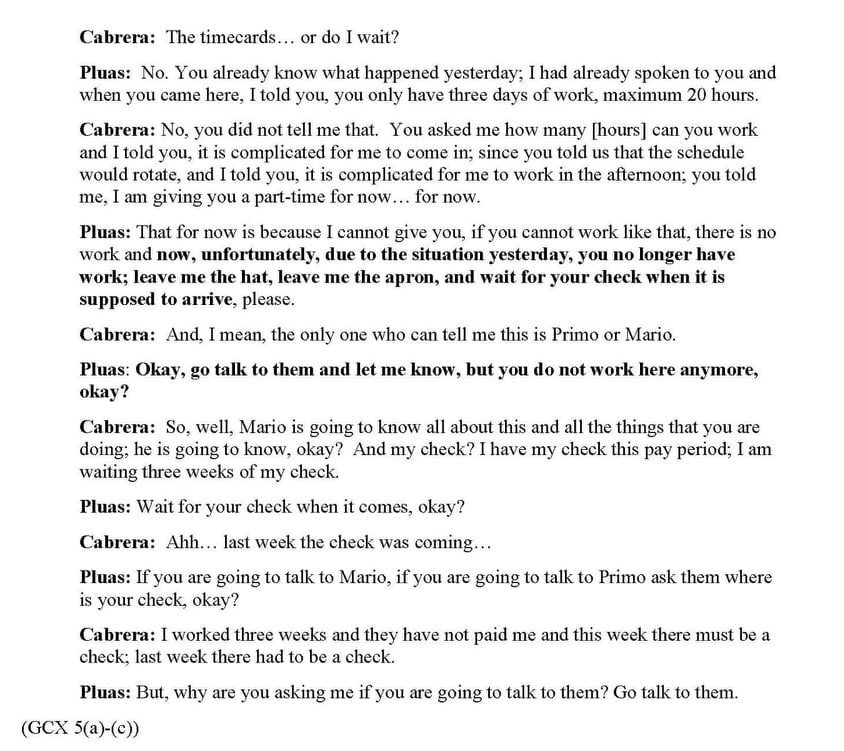
Cabrera testified that she stopped the recording as she stood up to leave and as she did so Pluas told her that she had to leave her apron. She refused, stating that the apron was hers. He replied that he had given everyone an apron when they started working. Cabrera asserted that he had not given her one, that she had bought the apron with her own money and was going to keep it and that the only thing he had given her was a cap. She left the cap on the table and left.
Pluas testified that what he meant in this conversation was that he could not change the schedule for the week of May 25‒31. He also testified that he asked for Cabrera's cap and apron because he thought she was refusing to work the rest of that week.
Because of the conversation they had the night before, the discussions they had among themselves about the schedule, and they—that they were not agreeing to get you to talk to me directly.
The testimony was not a credible explanation for Pluas' assumption that Cabrera did not want to work anymore that week. However, it is a concession that his conduct on May 25 was motivated by animus towards the discriminatees' text exchange the night before.
Cabrera then called Robert (Primo) who had been the manager of the 59th Street restaurant before Pluas, to ask for his assistance. He told her he could not help her.
At 6:21 p.m. on May 25, Cabrera sent Pluas a text message asking for a termination letter,
"I only want you to give me a letter with the reason why you fired me, with your contact information . . ."
Pluas did not respond, nor did he deny receiving this text. Cabrera and Delgado tried to make an appointment to talk to Owner Mario Acuna on May 28, but they were unsuccessful. Respondent did not give Cabrera or Delgado a termination letter.
Pluas also testified that Cabrera was supposed to work on Wednesday, May 27 but did not show up. He testified that he asked Chavez to call Cabrera.
The ALJ found this testimony to be incredible for several reasons:
1) Please failure to respond to Cabrera's May 25 evening text. If he had not fired her, he would have responded that Cabrera misunderstood him
2) Chavez did not corroborate his assertion that he told her to call Cabrera to come to work again.
Delgado went to the 59th street restaurant on Tuesday, May 26. She was scheduled to work that day from 4 p.m. to closing time. She had not been scheduled for work on Monday. Delgado testified that Pluas called her and told her to wait for him outside when she arrived. After waiting for a while, she went into the restaurant where Pluas told her there was no more work. According to Delgado, Pluas shook a copy of the schedule and text messages at her and told her she had been disrespectful. Delgado also testified that she asked Pluas for a termination letter. He responded that she'd get one from Respondent's attorney. Delgado took her check and left the restaurant.
Pluas testified that he also told Delgado he could not change the schedule for the week of May 25‒31. Then she got angry and left the restaurant. He concedes he saw Delgado in the restaurant parking lot, where according to Pluas, she threatened to sue him. Pluas testified that it was then that he removed Delgado from the schedule permanently. This testimony is also incredible.
It is very unlikely that Delgado would have threatened to sue Pluas if all he said was that he could not change the schedule for that 1 week. I conclude that Pluas, on May 25 to Cabrera and on May 26 to Delgado, made it very clear that these employees were being terminated. Please testimony at Tr. 120‒21 also makes it clear that Cabrera did not quit. I conclude that neither Cabrera nor Delgado would have been terminated but for Pluas' animus towards their text exchanges on the night of May 24.
LEGAL ANALYSIS
Section 8(a)(1) of the National Labor Relations Act provides that it is an unfair labor practice to interfere with, restrain or coerce employees in the exercise of the rights guaranteed in Section 7. Discharging or otherwise discriminating against employees because they engaged in activity protected by Section 7 is a violation of Section 8(a)(1).
Section 7 provides that, "employees shall have the right to self-organization, to form, join, or assist labor organizations, to bargain collectively through representatives of their own choosing, and to engage in other concerted activities for the purpose of collective bargaining or other mutual aid or protection . . . (Emphasis added)"
In Myers Industries (Myers 1), 268 NLRB 493 (1984), and in Myers Industries (Myers II) 281 NLRB 882 (1986), the Board held that "concerted activities" protected by Section 7 are those "engaged in with or on the authority of other employees, and not solely by and on behalf of the employee himself." However, the activities of a single employee in enlisting the support of fellow employees in mutual aid and protection is as much concerted activity as is ordinary group activity.
To establish an 8(a)(1) violation based on an adverse employment action where the motive for the action is disputed, the General Counsel has the initial burden of showing that protect- ed activity was a motivating factor for the action, Wright Line, 251 NLRB 1083 (1980). The General Counsel satisfies that burden by proving the existence of protected activity, the employer's knowledge of the activity, and animus against the activity that is sufficient to create an inference that the employee's protected activity was a motivating factor in his or her discharge. If the General Counsel meets his burden, the burden shifts to the employer to demonstrate that the same action would have taken place even in the absence of the protected conduct. [3,4]
Cabrera and Delgado engaged in protected concerted activity when concertedly complaining about Respondent's work schedule and the number of hours they were scheduled to work. Respondent, by Pluas, was aware of these complaints and as exhibited by his conversations with Cabrera and Delgado, displayed animus towards their protected activity. He terminated them as a result of that animus.
CONCLUSION OF LAW
Respondent, Zacatacos, Incorporated, violated Section 8(a)(1) of the Act by discharging Gloria Cabrera on May 25, 2020 and discharging Elia Delgado on May 26, 2020.
REMEDY
The Respondent, having discriminatorily discharged employees, must offer them reinstatement and make them whole for any loss of earnings and other benefits. Backpay shall be computed in accordance with F. W. Woolworth Co., 90 NLRB 289 (1950), with interest at the rate prescribed in New Horizons, 283 NLRB 1173 (1987), compounded daily as prescribed in Kentucky River Medical Center, 356 NLRB 6 (2010). Respondent shall also compensate Gloria Cabrera and Elia Delga- do for any reasonable search-for-work and interim employment expenses regardless of whether those expenses exceed interim earnings. Search-for-work and interim employment expenses shall be calculated separately from taxable net back pay, with interest at the rate prescribed in New Horizons, above, compounded daily as prescribed in Kentucky River Medical Center, above.
Respondent shall reimburse the discriminatees in amounts equal to the difference in taxes owed upon receipt of a lump-sum back pay award and taxes that would have been owed had there been no discrimination. Respondent shall also take whatever steps are necessary to ensureensure that the Social Security Administration credits the discriminatees' backpay to the proper quarters on their Social Security earnings records. To this end, Respondent shall file with the Regional Director for Region 13, within 21 days of the date the amount of backpay is fixed, either by agreement or Board order, a report allocating the back- pay award to the appropriate calendar years.
On these findings of fact and conclusions of law and on the entire record, I issue the following recommended5
ORDER
Respondent, Zacatacos, Incorporated, its officers, agents, successors, and assigns, shall
1. Cease and desist from
(a) Discharging or otherwise discriminating against any of its employees for engaging in and/or planning to engage in protected concerted activities, including but not limited to ex- changing text messages complaining about their work schedules.
(b) In any like or related manner interfering with, restrain- ing, or coercing its employees in the exercise of their rights under Section 7 of the Act.
2. Take the following affirmative action necessary to effectuate the policies of the Act.
(a) Within 14 days from the date of the Board's Order, offer Gloria Cabrera and Elia Delgado full reinstatement to their former jobs or, if those jobs no longer exist, to substantially equivalent positions, without prejudice to their seniority or any other rights or privileges previously enjoyed.
(b) Make Cabrera and Delgado whole for any loss of earnings and other benefits suffered as a result of the discrimination against them, in the manner set forth in the remedy section of the decision.
(c) Compensate Cabrera and Delgado for their search-for- work and interim employment expenses regardless of whether those expenses exceed their interim earnings.
(d) Compensate Cabrera and Delgado for the adverse tax consequences, if any, of receiving a lump-sum backpay award, and file with the Regional Director for Region 13, within 21 days of the date the amount of backpay is fixed, either by agreement or Board order, a report allocating the back pay awards to the appropriate calendar years.
(e) File with the Regional Director for Region 13 a copy of each backpay recipient's corresponding W-2 form(s) reflecting the backpay award.
(f) Within 14 days from the date of the Board's Order, re-move from its files any reference to the unlawful discharges and within 3 days thereafter notify Cabrera and Delgado in writing that this has been done and that the discharges will not be used against them in any way.
(g) Preserve and, within 14 days of a request, or such additional time as the Regional Director may allow for good cause shown, provide at a reasonable place designated by the Board or its agents, all payroll records, social security payment records, timecards, personnel records and reports, and all other records, including an electronic copy of such records if stored in electronic form, necessary to analyze the amount of backpay due under the terms of this Order.
(h) Within 14 days after service by the Region, post at its Metropolitan Chicago, Illinois facilities copies of the attached notice marked "Appendix" in both English and in Spanish. [6] Copies of the notice, on forms provided by the Regional Director for Region 13, after being signed by the Respondent's authorized representative, shall be posted by the Respondent and maintained for 60 consecutive days in conspicuous places in- cluding all places where notices to employees are customarily posted. In addition to physical posting of paper notices, the notices shall be distributed electronically in both English and in Spanish, such as by email, posting on an intranet or an internet site, and/or other electronic means, if the Respondent customarily communicates with its employees by such means. Reason- ble steps shall be taken by the Respondent to ensure that the notices are not altered, defaced, or covered by any other material. In the event that, during the pendency of these proceedings, the Respondent has gone out of business or closed the facility involved in these proceedings, the Respondent shall duplicate and mail, at its own expense, a copy of the notice in both English and in Spanish to all current employees and former employees employed by the Respondent at any time since May 25, 2020.
(i) Within 21 days after service by the Region, file with the Regional Director a sworn certification of a responsible official on a form provided by the Region attesting to the steps that the Respondent has taken to comply.
Dated, Washington, D.C. June 23, 2021
----------------------------------------------------
[1] He had apparently taken all the servers' timecards so as to comply with CDC requirements, such as taking their temperature, before allowing them to work.
[2] This refers to the prior manager at the 59th street location Roberto (aka Primo which means first cousin in Spanish) and Mario Acuna, the president or owner of Zacatacos.
[3] The parties stipulated that the Spanish transcript and translation in to English accurately reflect the conversation. Additionally, with my high-school level knowledge of Spanish and a Spanish-English dictionary, I listened to the recording several times. I did so to make sure that the cold transcript does not inaccurately represent the tenor of the conversation. My conclusion is that the transcript and translation accurately depict the substance of the conversation.
[4] In cases in which the employer's motive for allegedly discriminatory discipline is at issue, the Wright Line test applies regardless of whether the employee was engaged in union activity or other protected concerted activity, Hoodview Vending Co., 362 NLRB 690 (2015); 359 NLRB 355 (2012).
[5] If no exceptions are filed as provided by Sec. 102.46 of the Board's Rules and Regulations, the findings, conclusions, and recommended Order shall, as provided in Sec. 102.48 of the Rules, be adopted by the Board, and all objections to them shall be deemed waived for all purposes.
[6] If this Order is enforced by a judgment of a United States court of appeals, the words in the notice reading "Posted by Order of the National Labor Relations Board" shall read "Posted Pursuant to a Judgment of the United States Court of Appeals Enforcing an Order of the National Labor Relations Board."
Zacatacos Incorporated Board Decision Case No. 13-CA-261409
https://apps.nlrb.gov/link/document.aspx/09031d45835704da
Post-Hearing Brief to ALJ Counsel for GC/Region 13-CA-261409
https://apps.nlrb.gov/link/document.aspx/09031d458349328c
Post-Hearing Brief to ALJ Charged Party/Respondent 13-CA-261409
https://apps.nlrb.gov/link/document.aspx/09031d458349543e
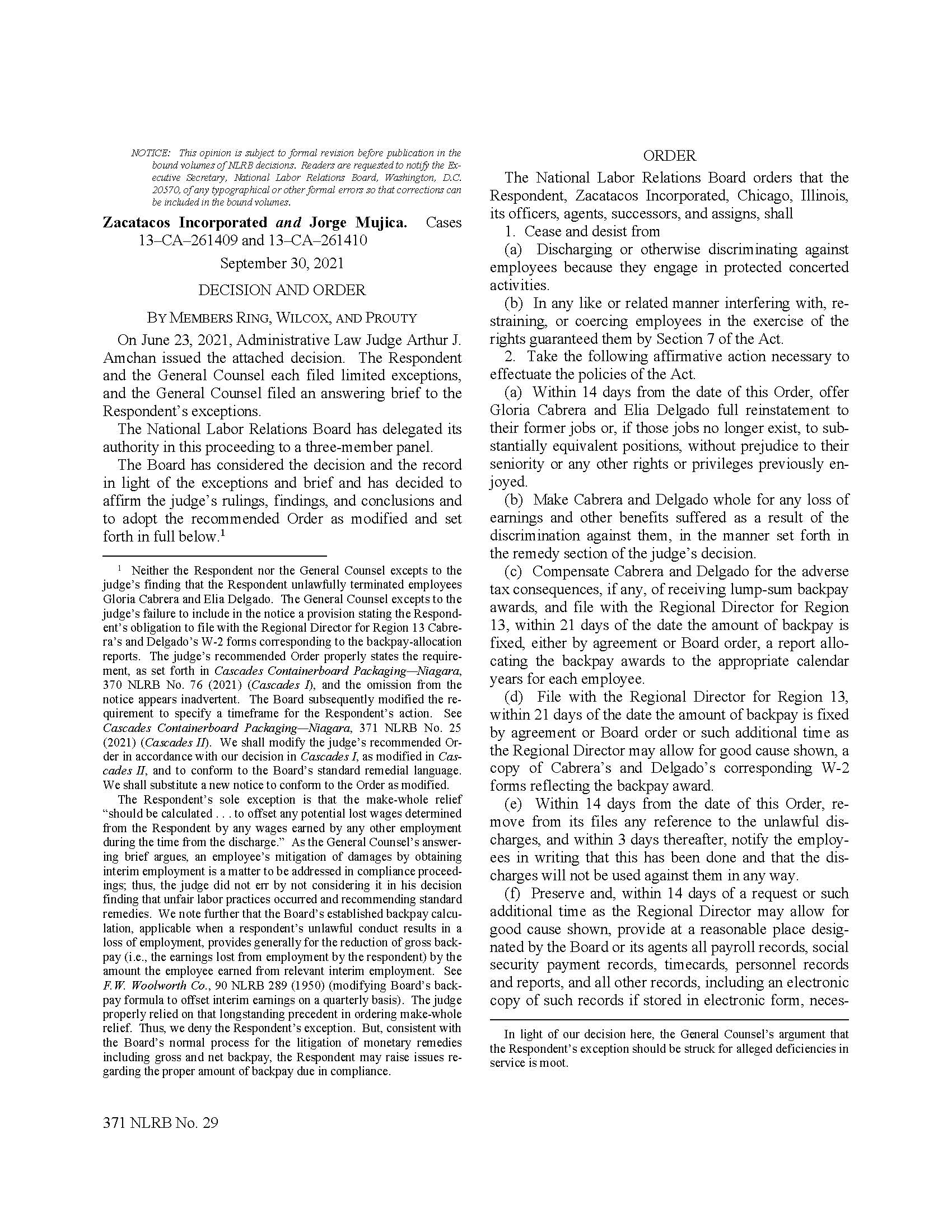
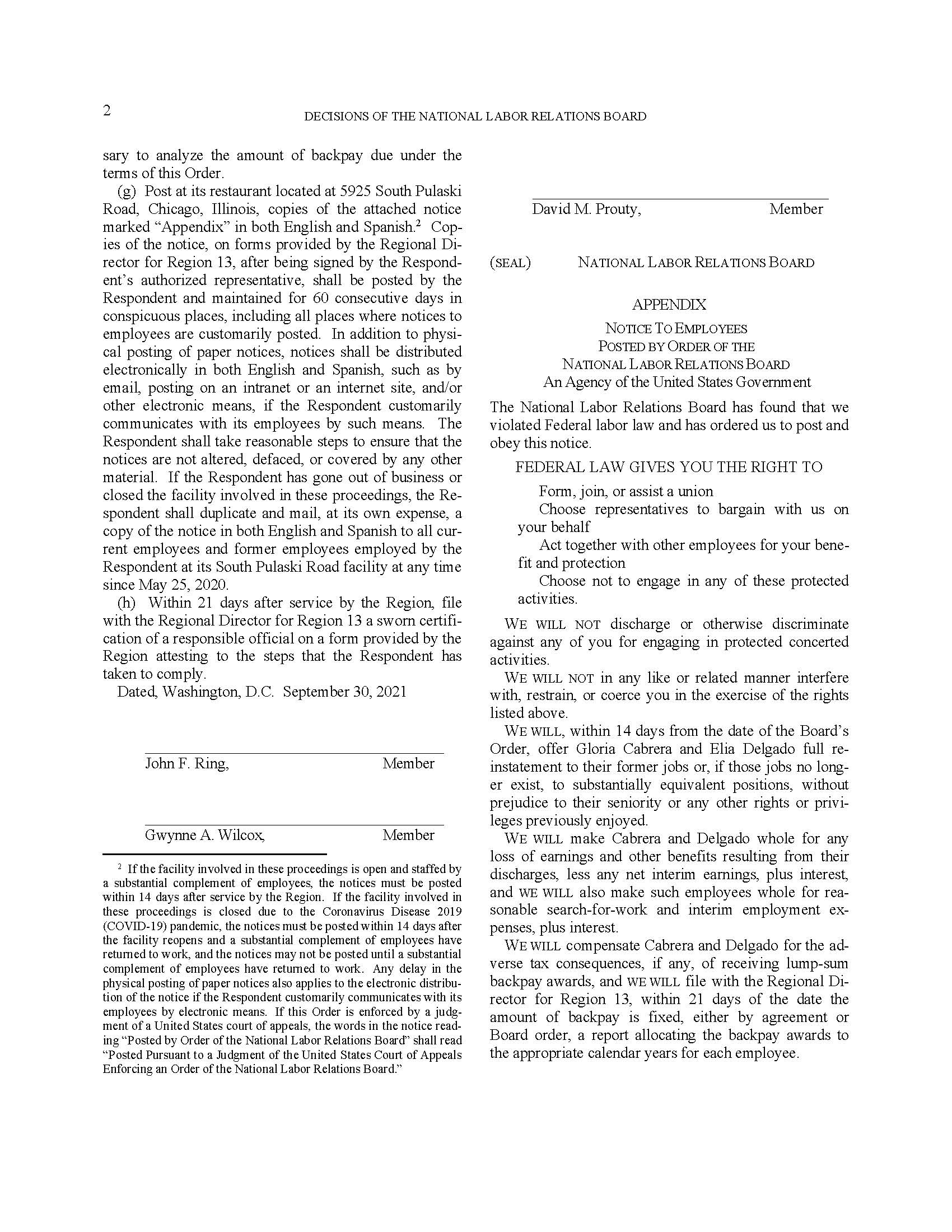
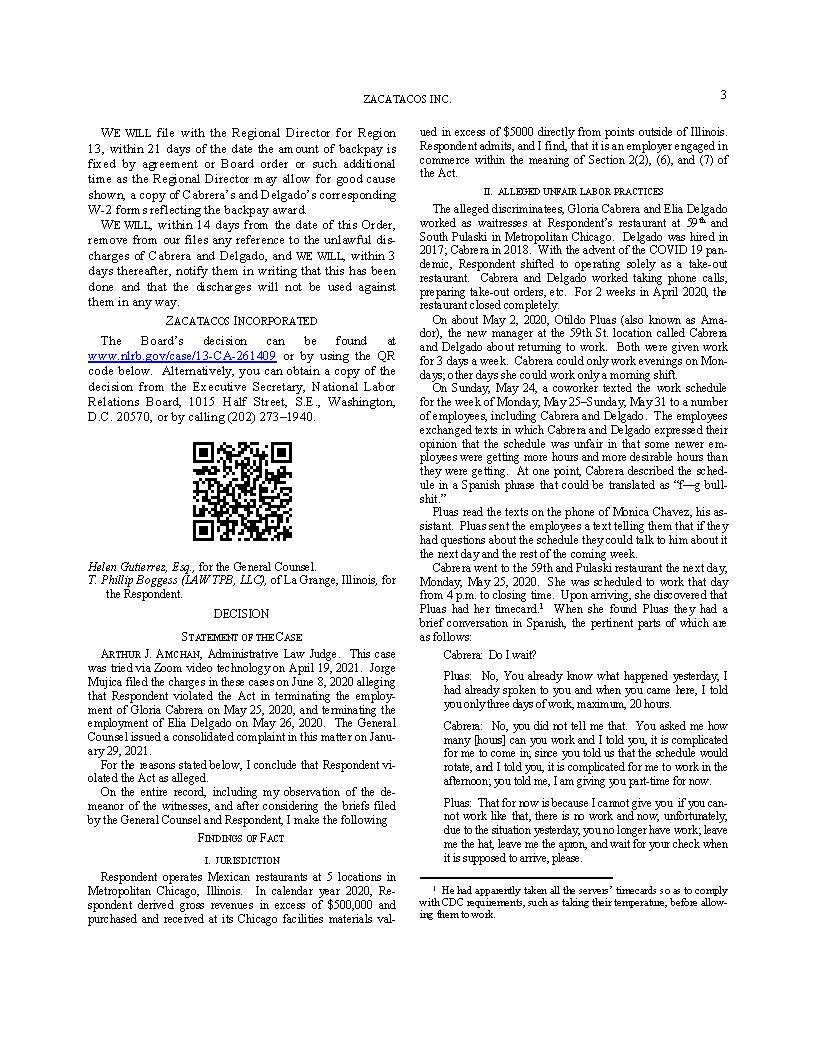
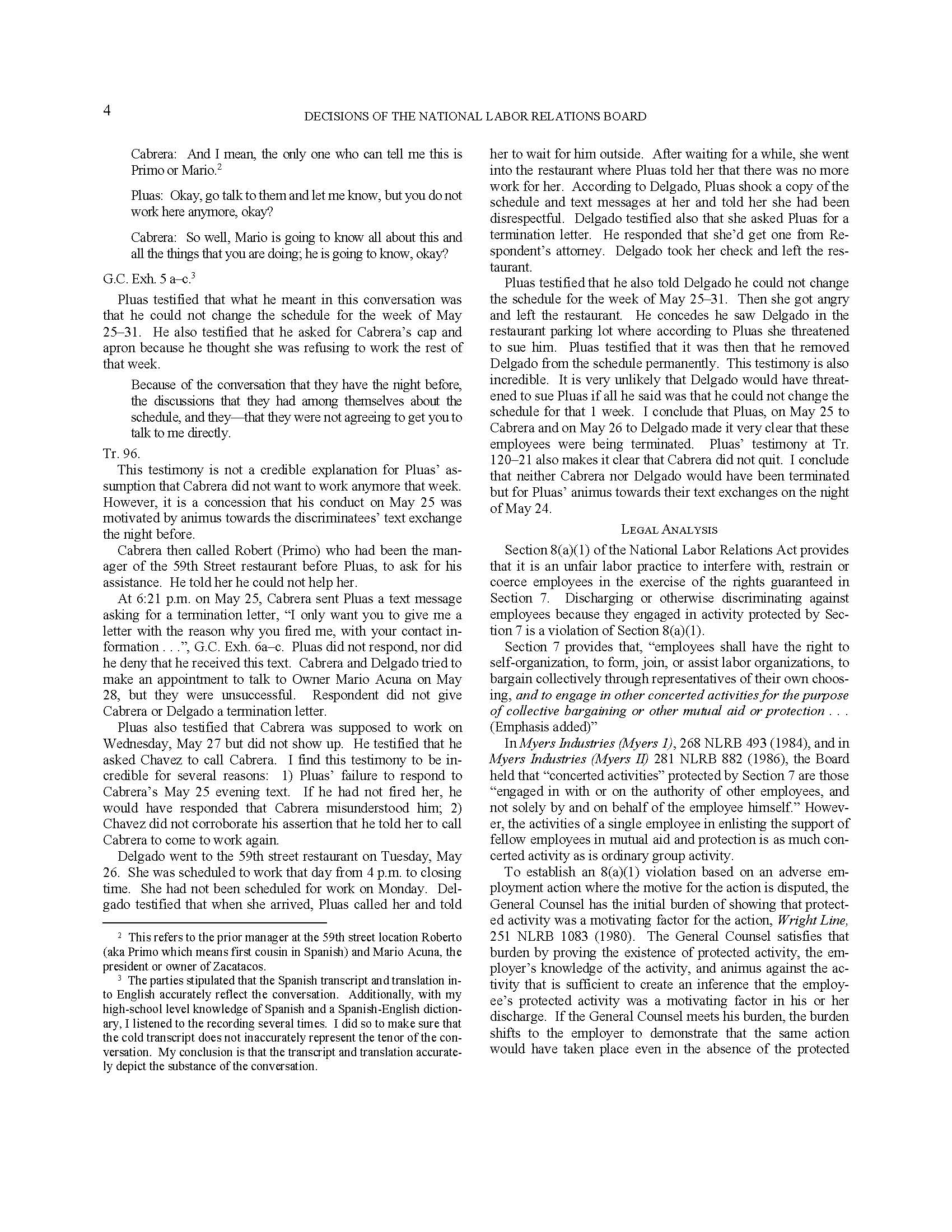
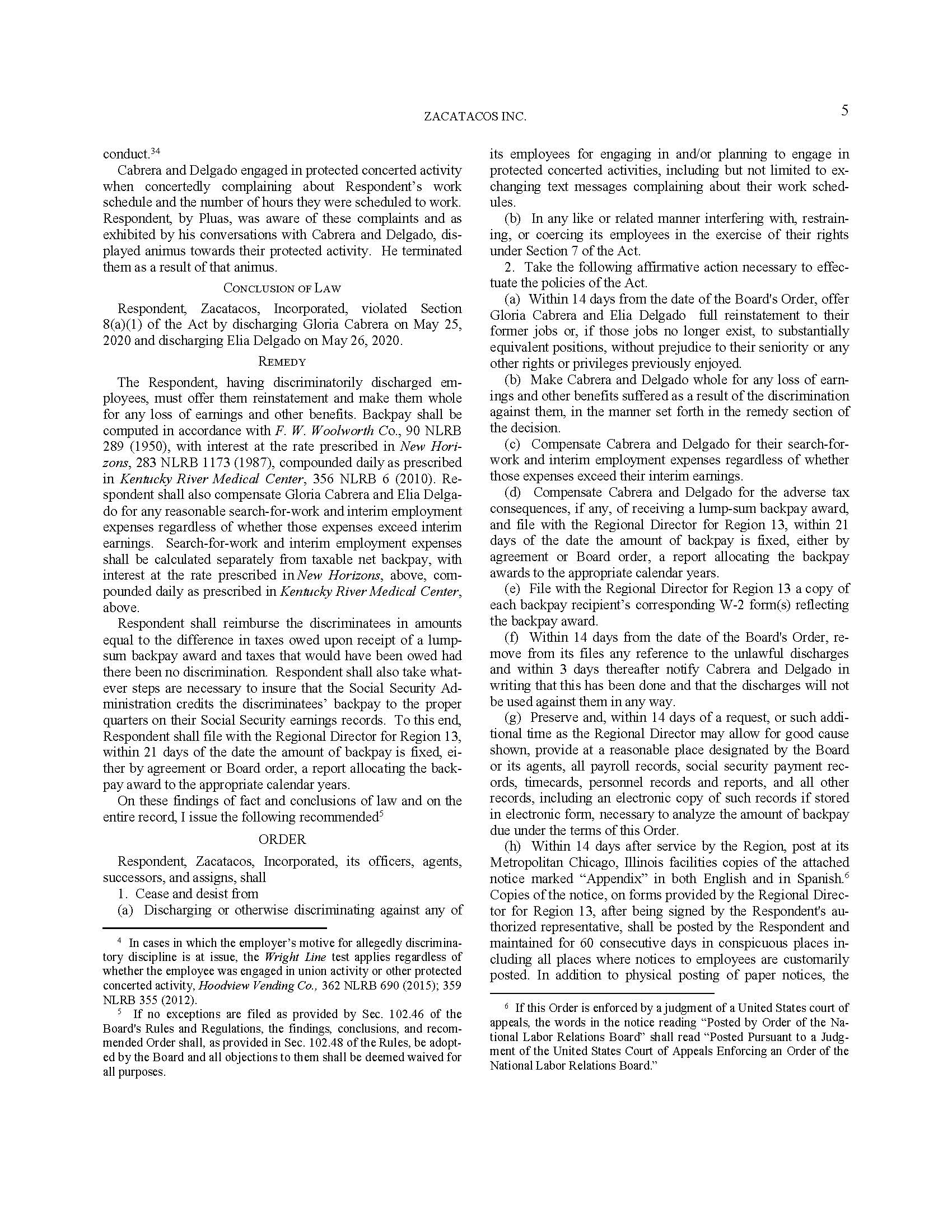
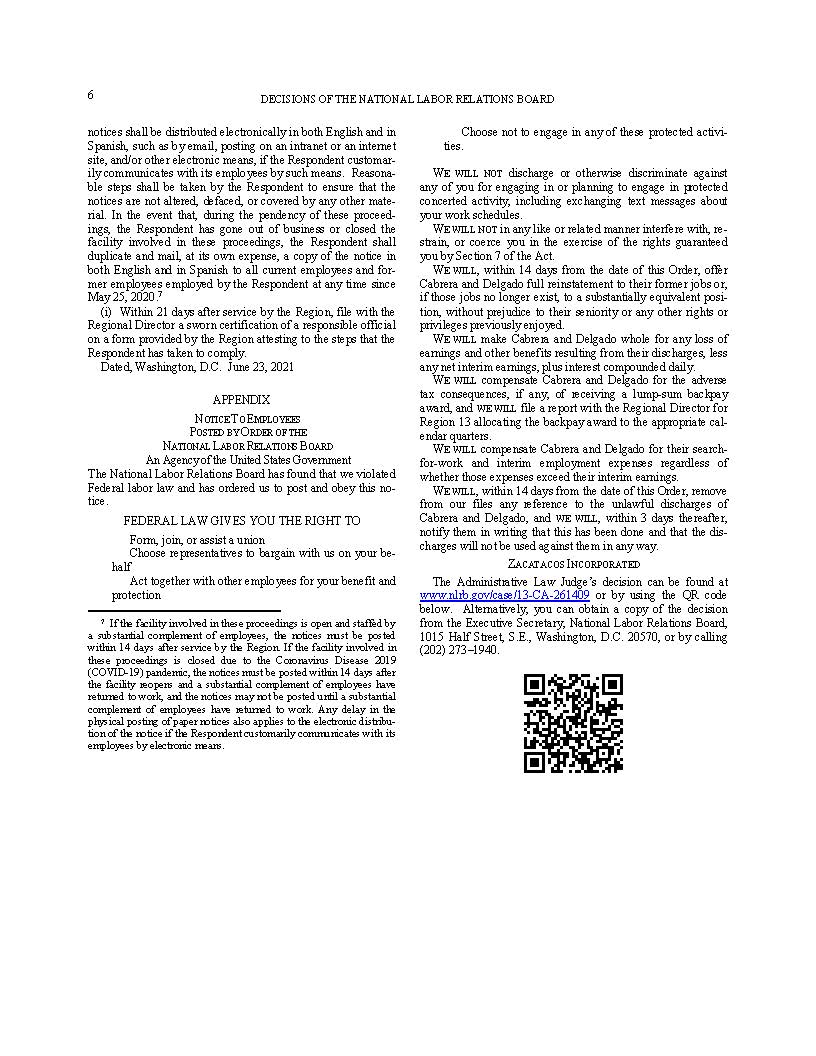
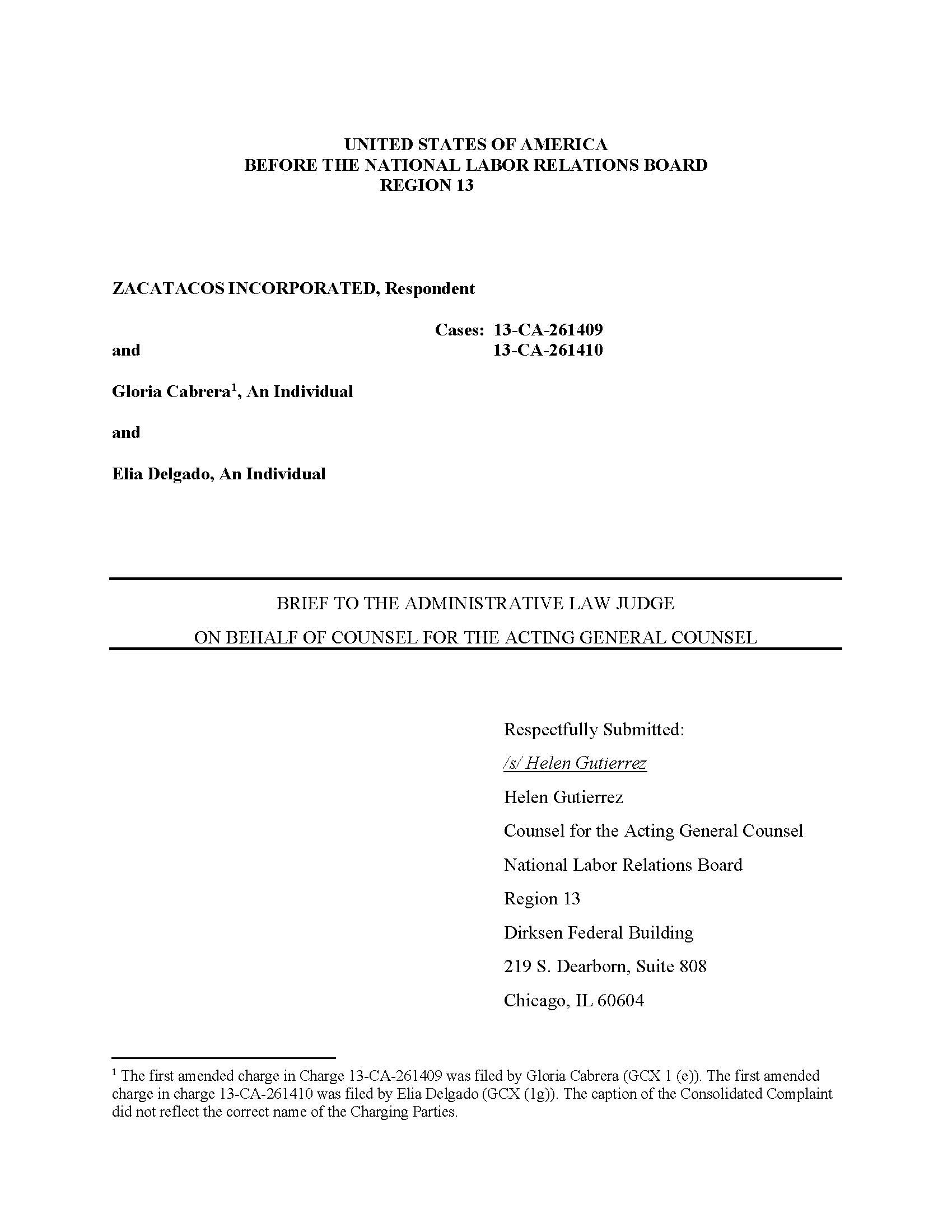
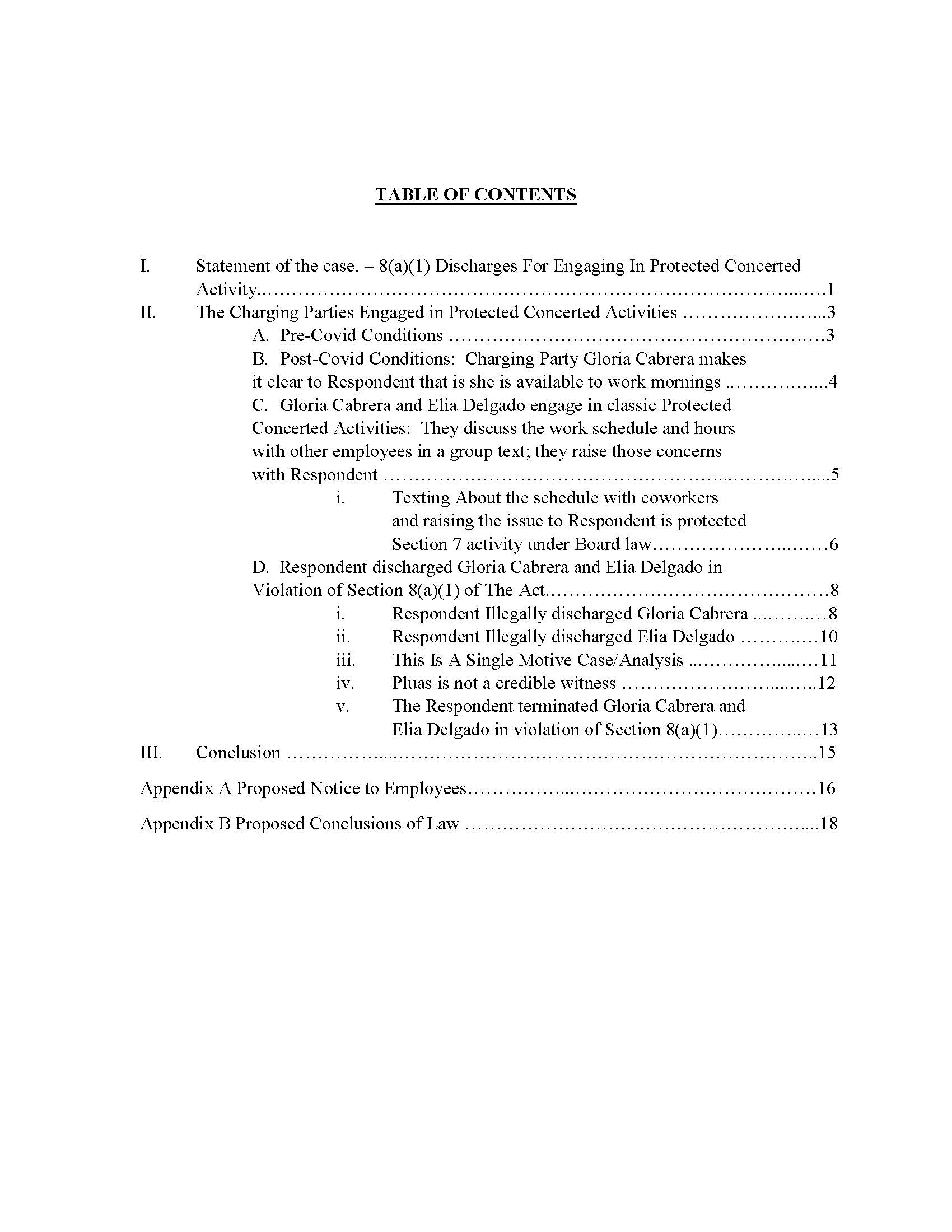
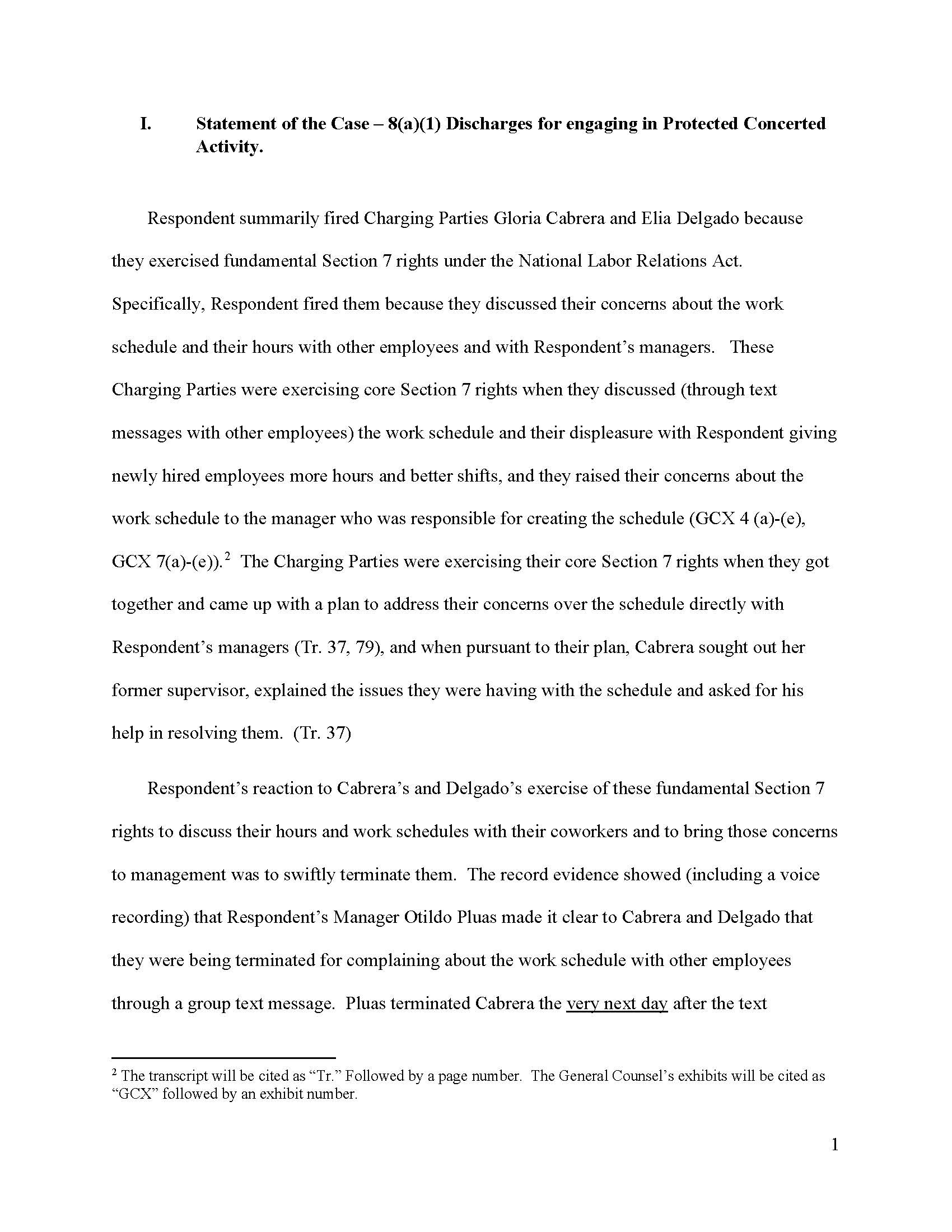
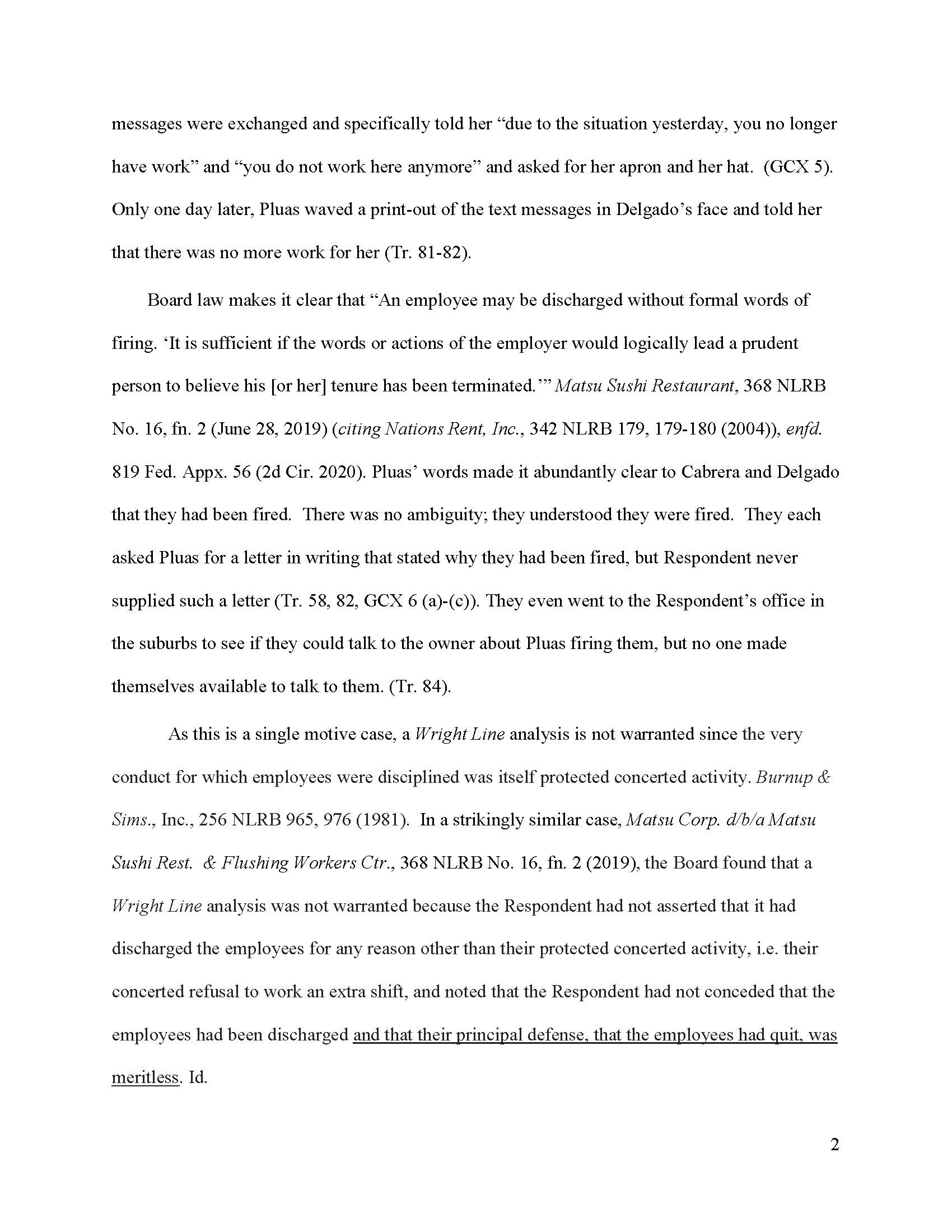
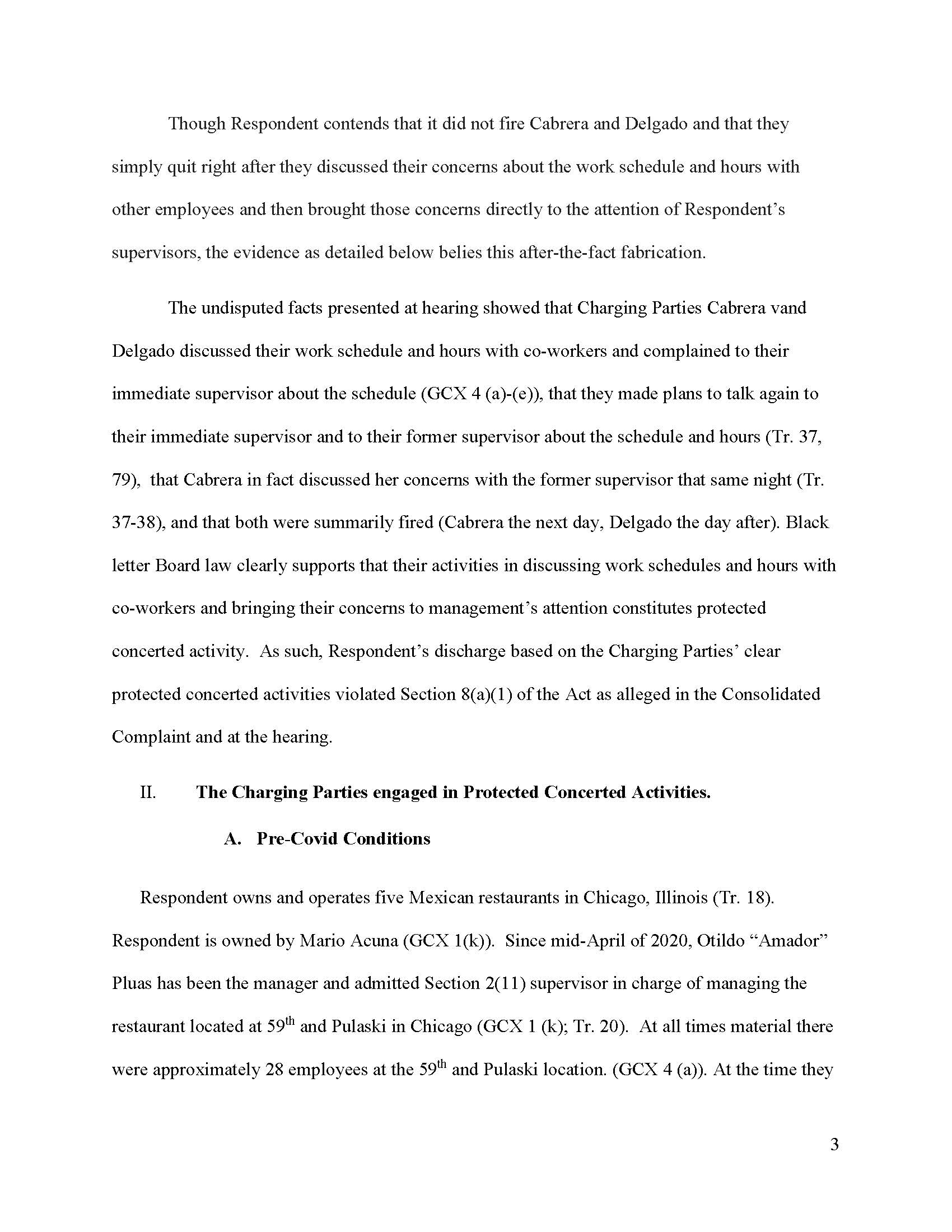
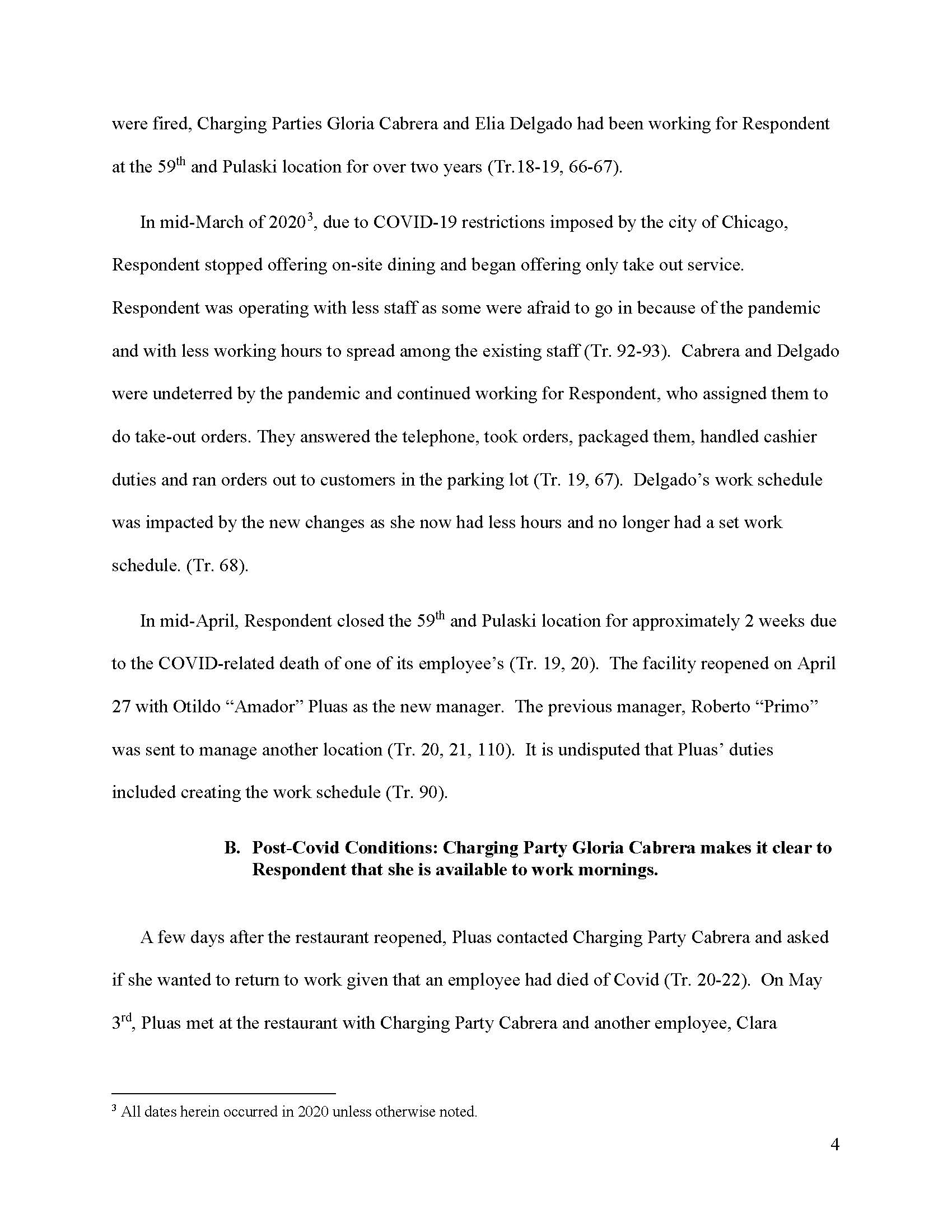
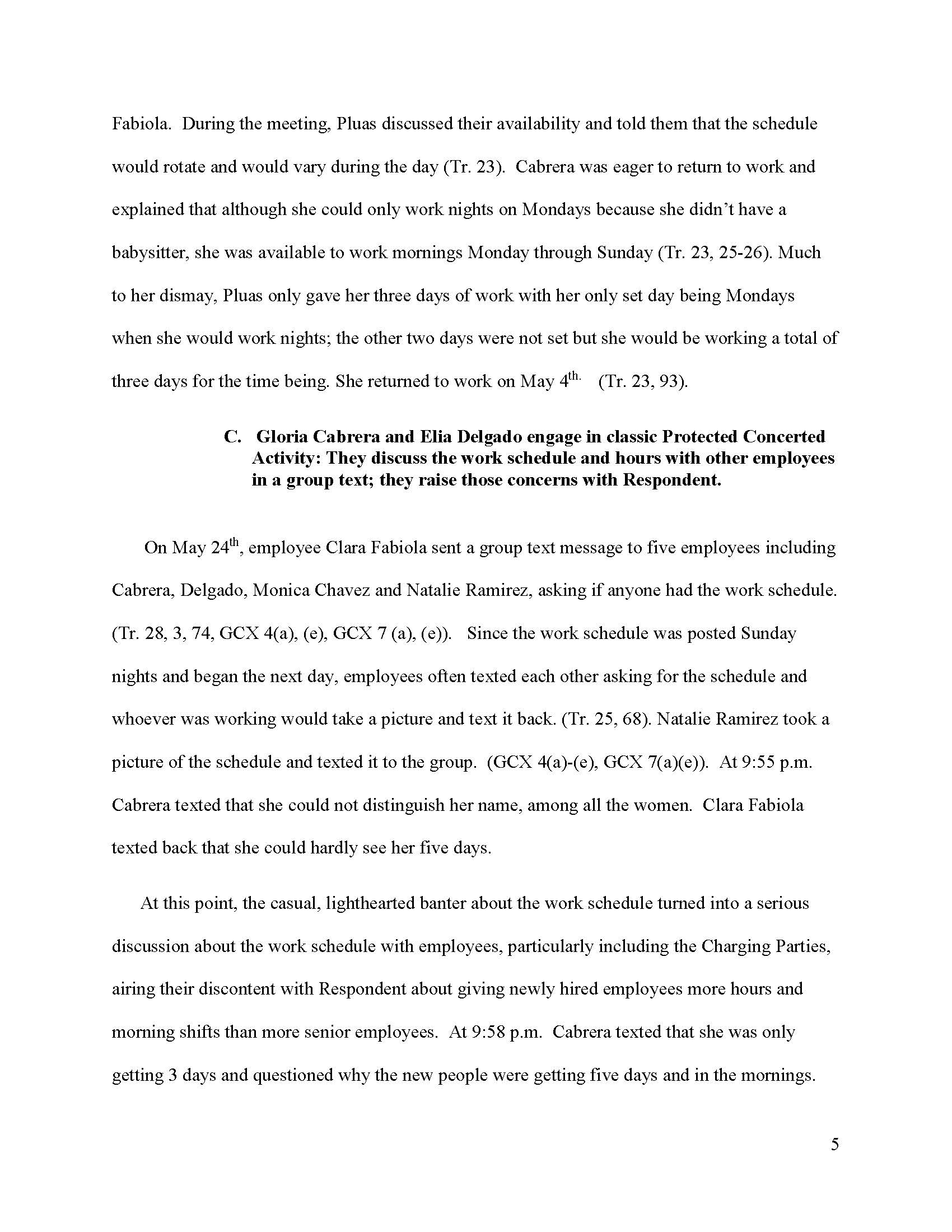
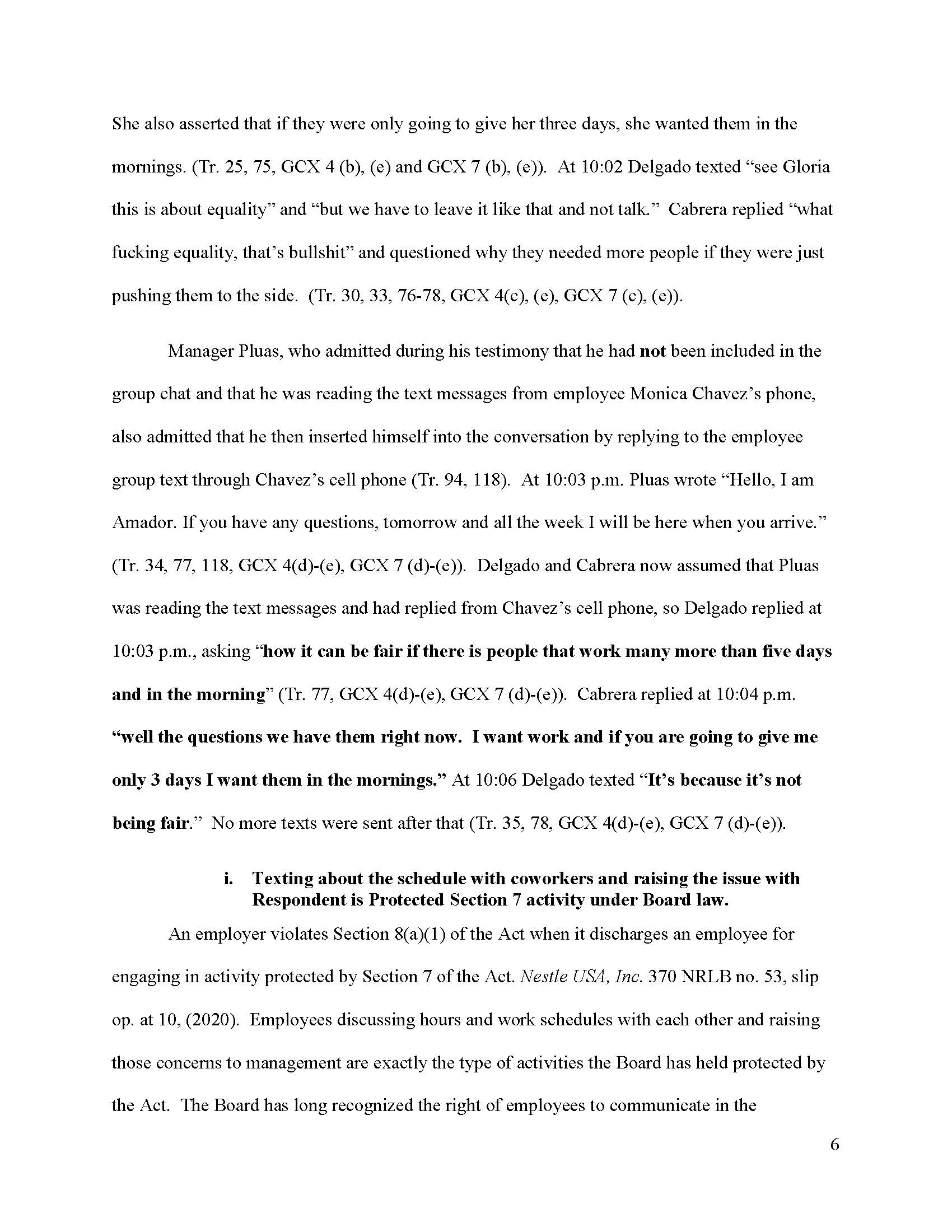
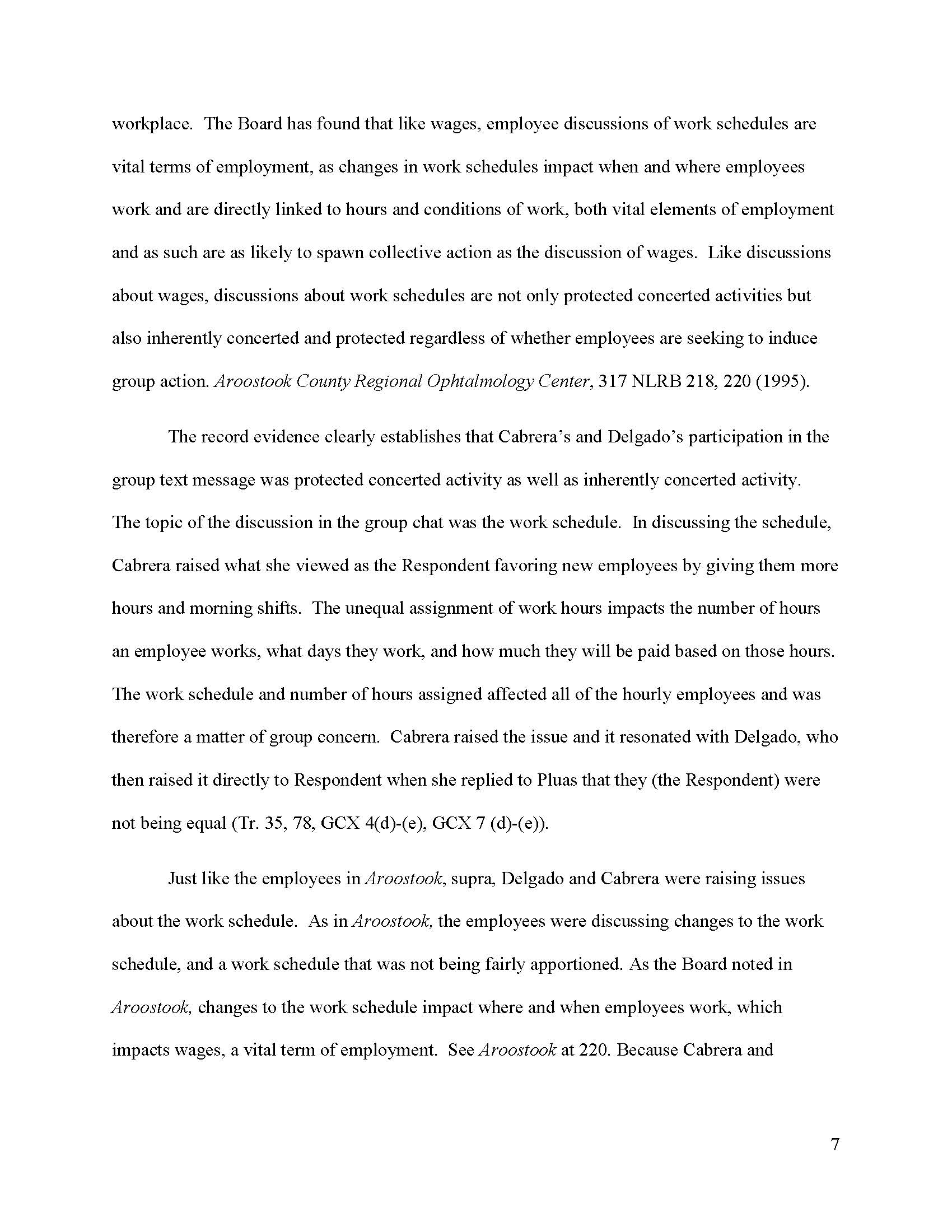
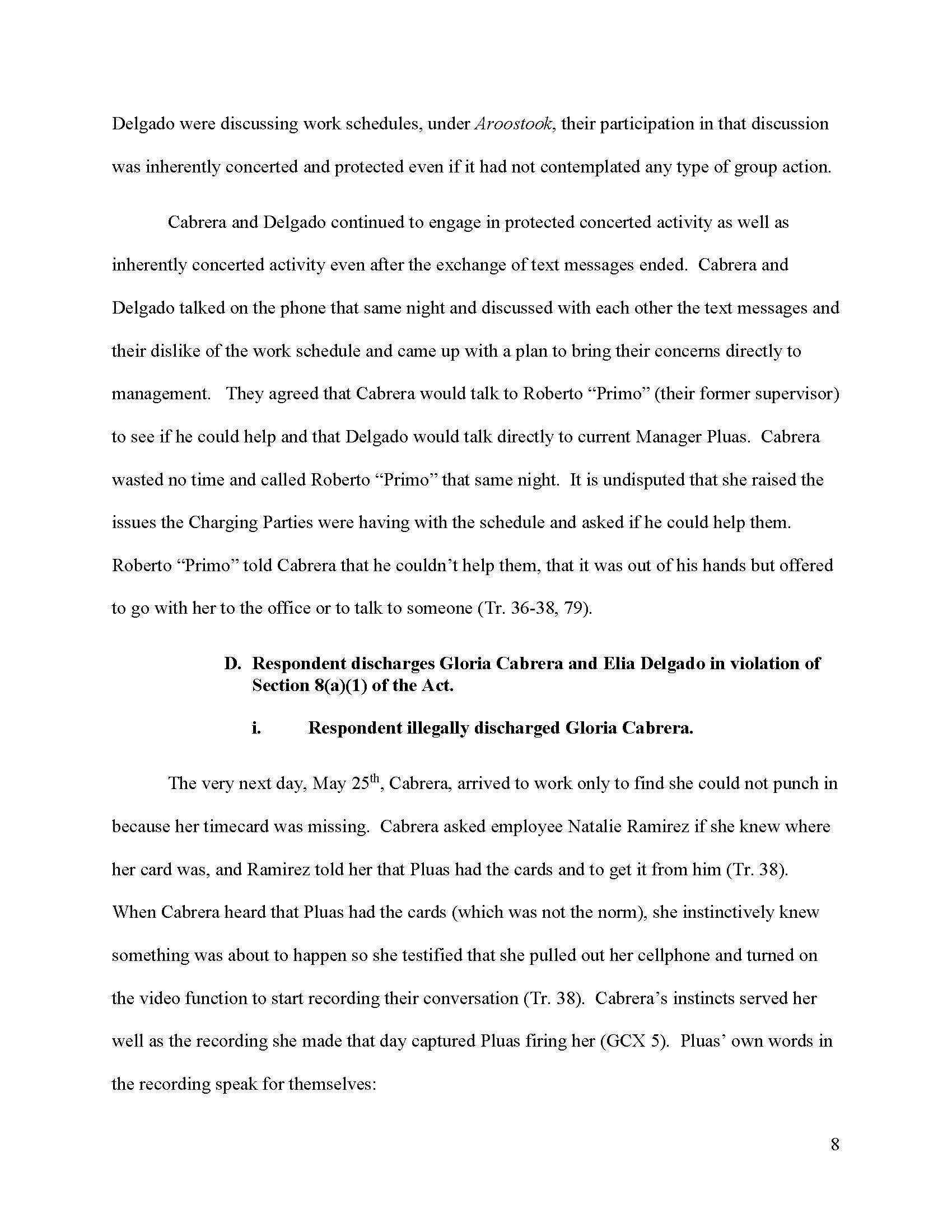
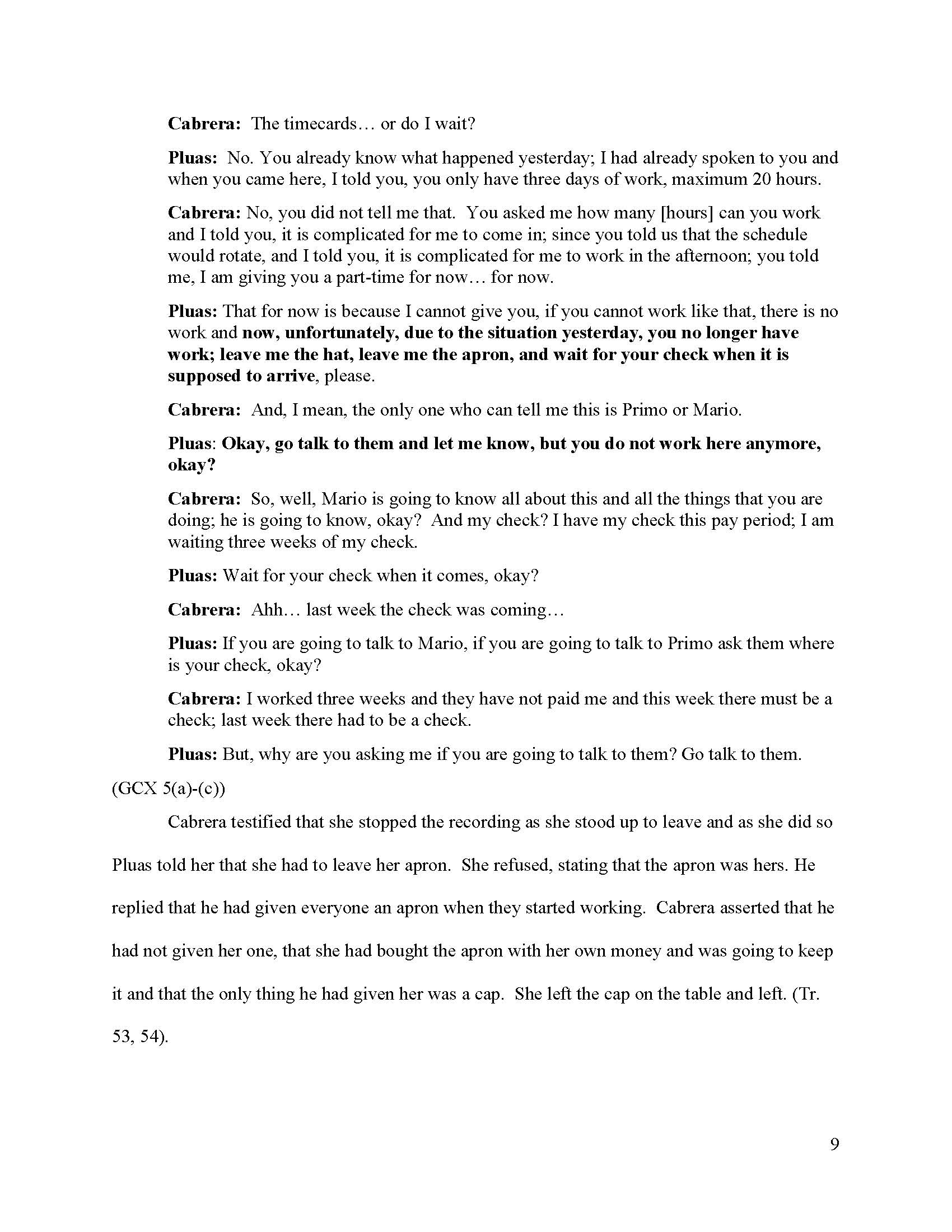
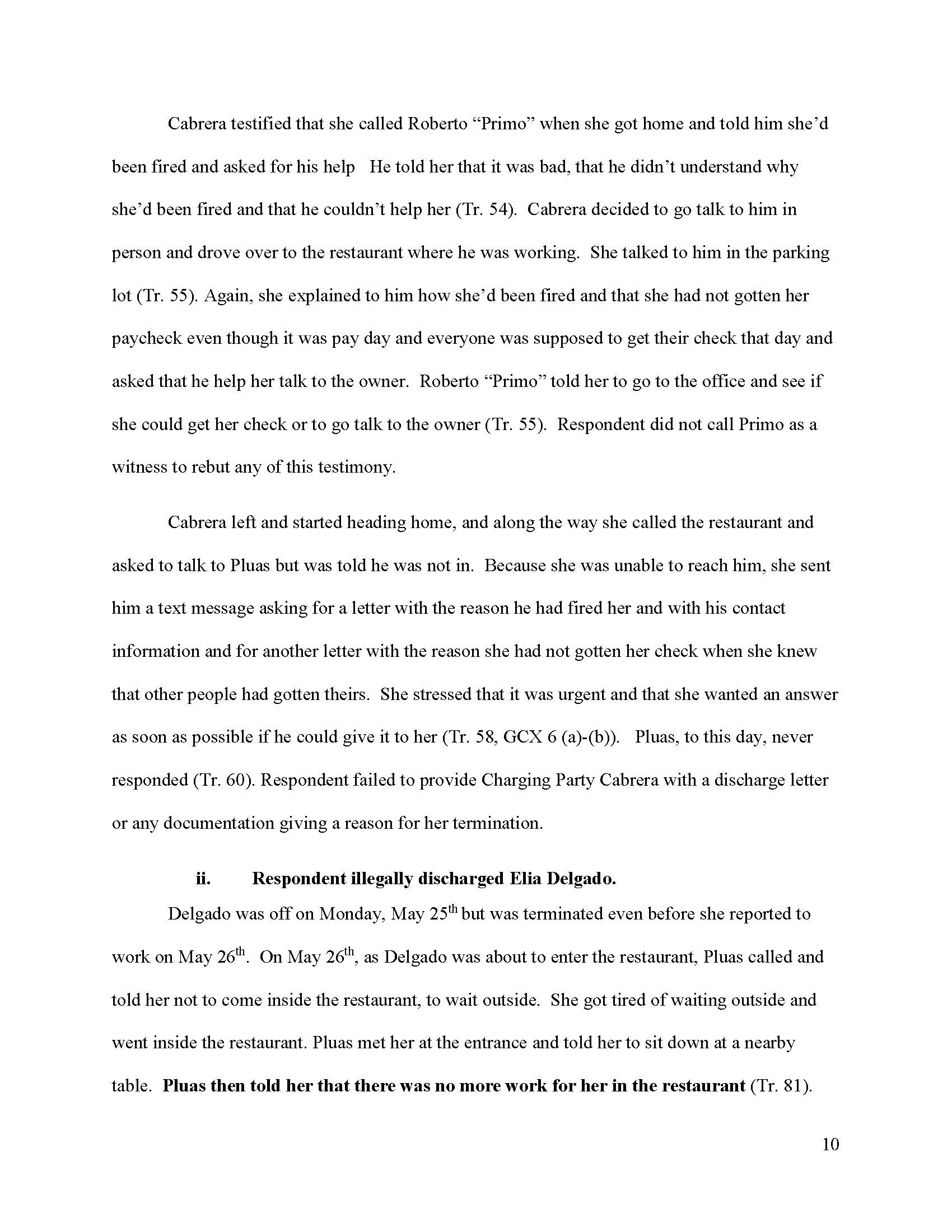
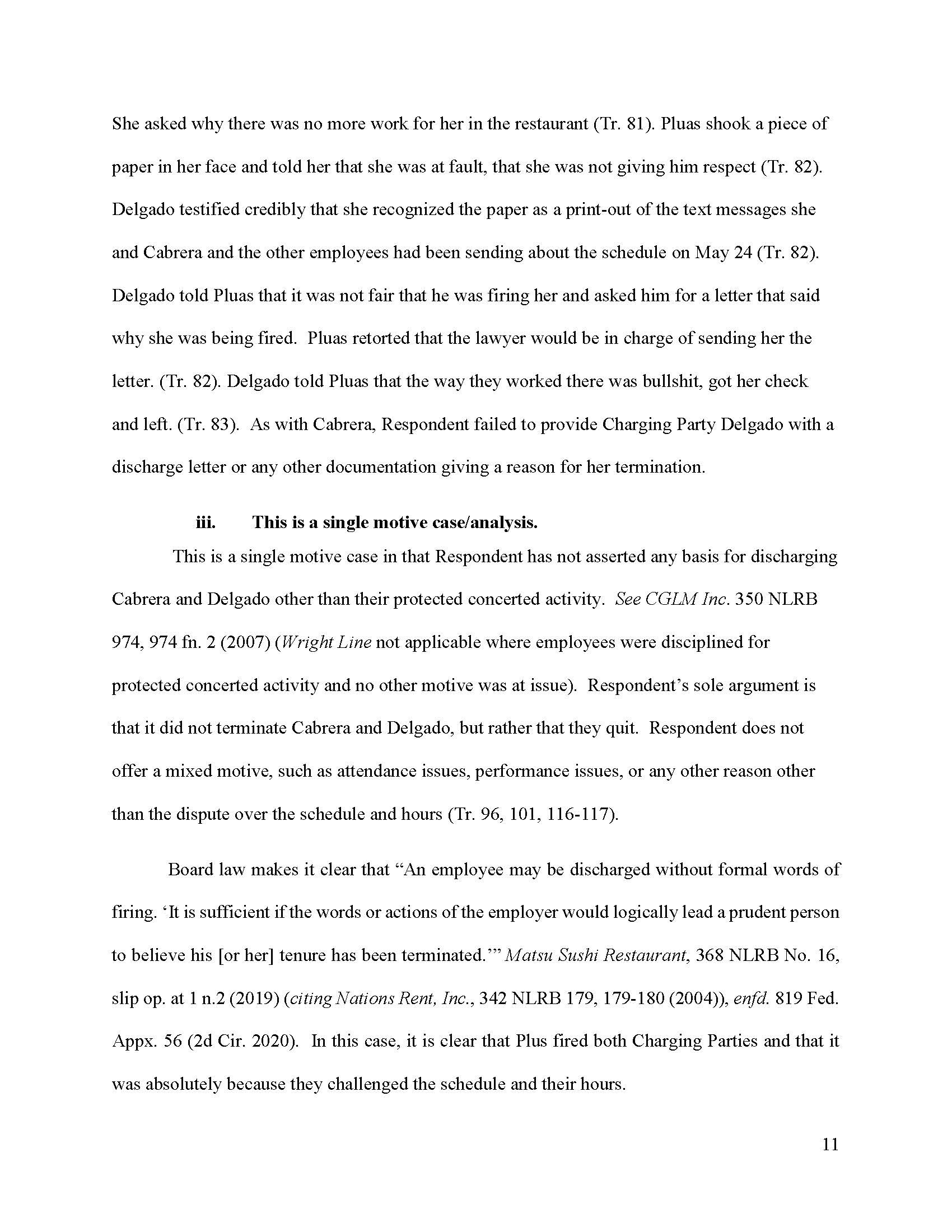
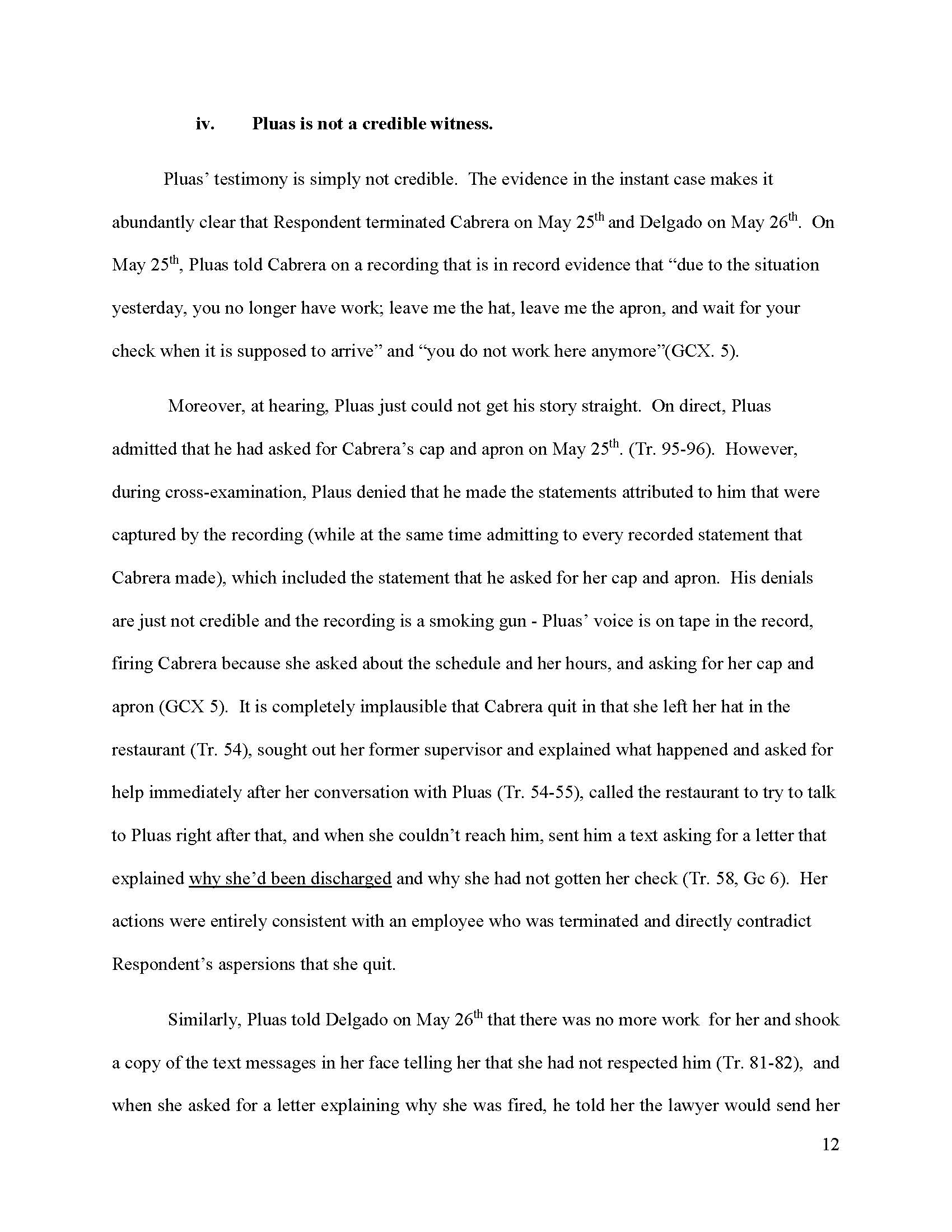
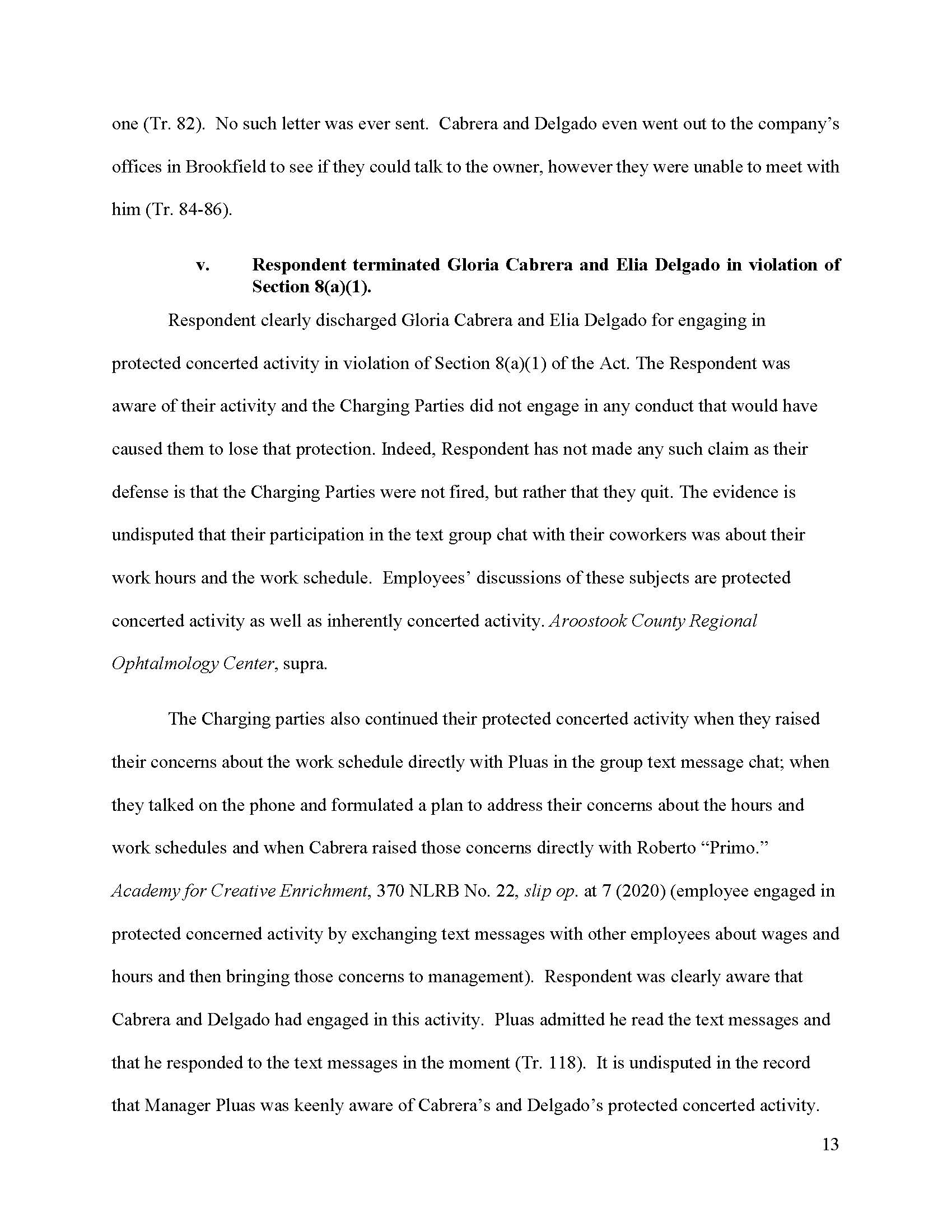
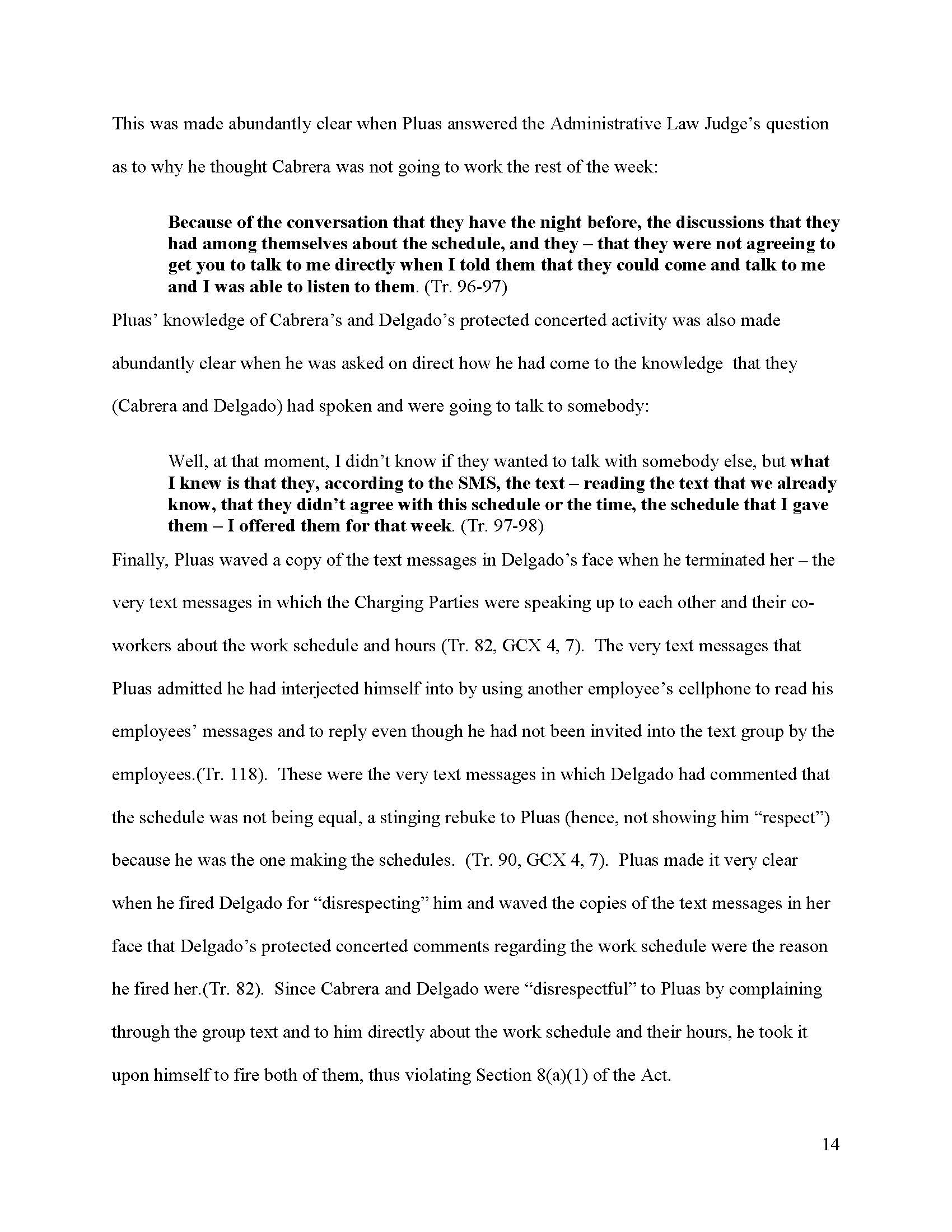
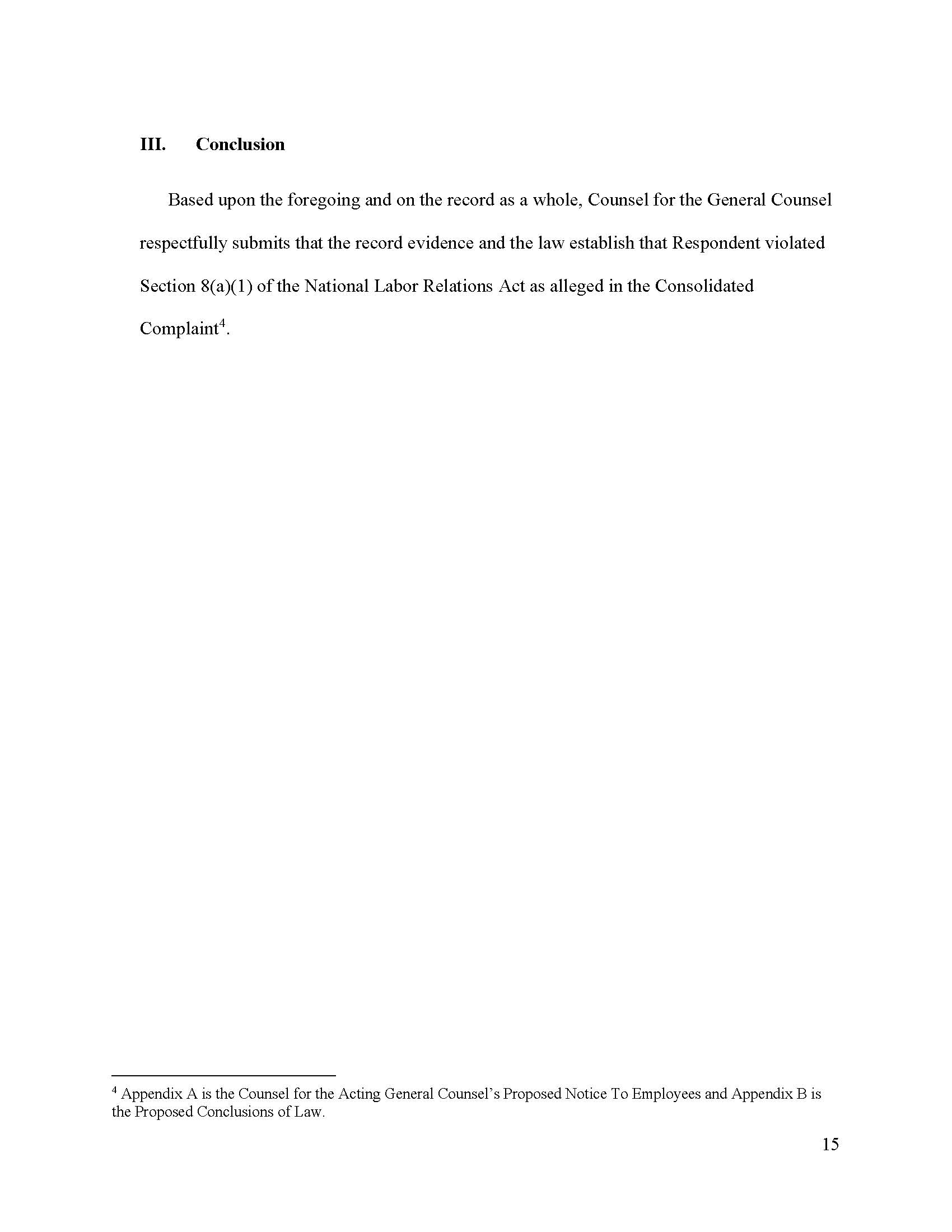
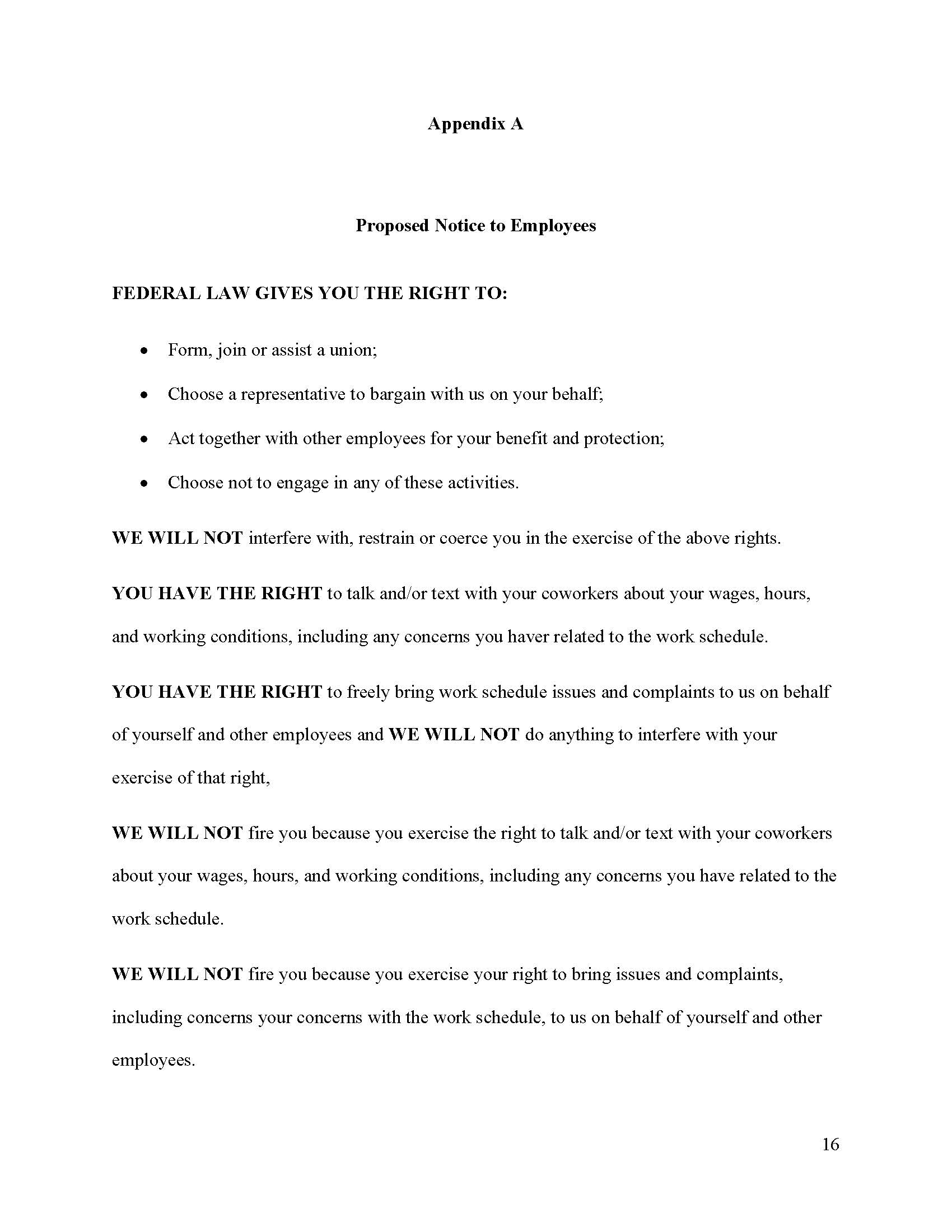
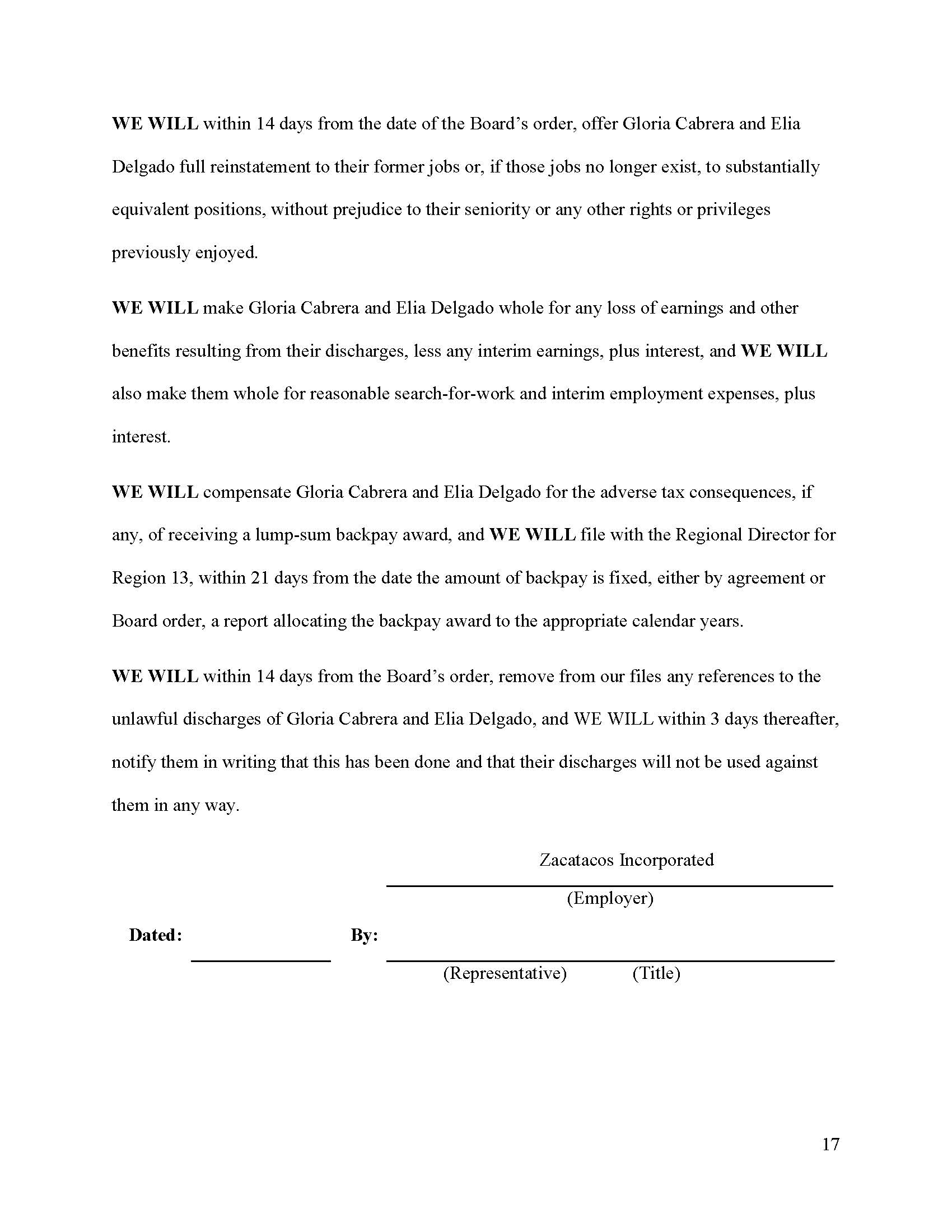
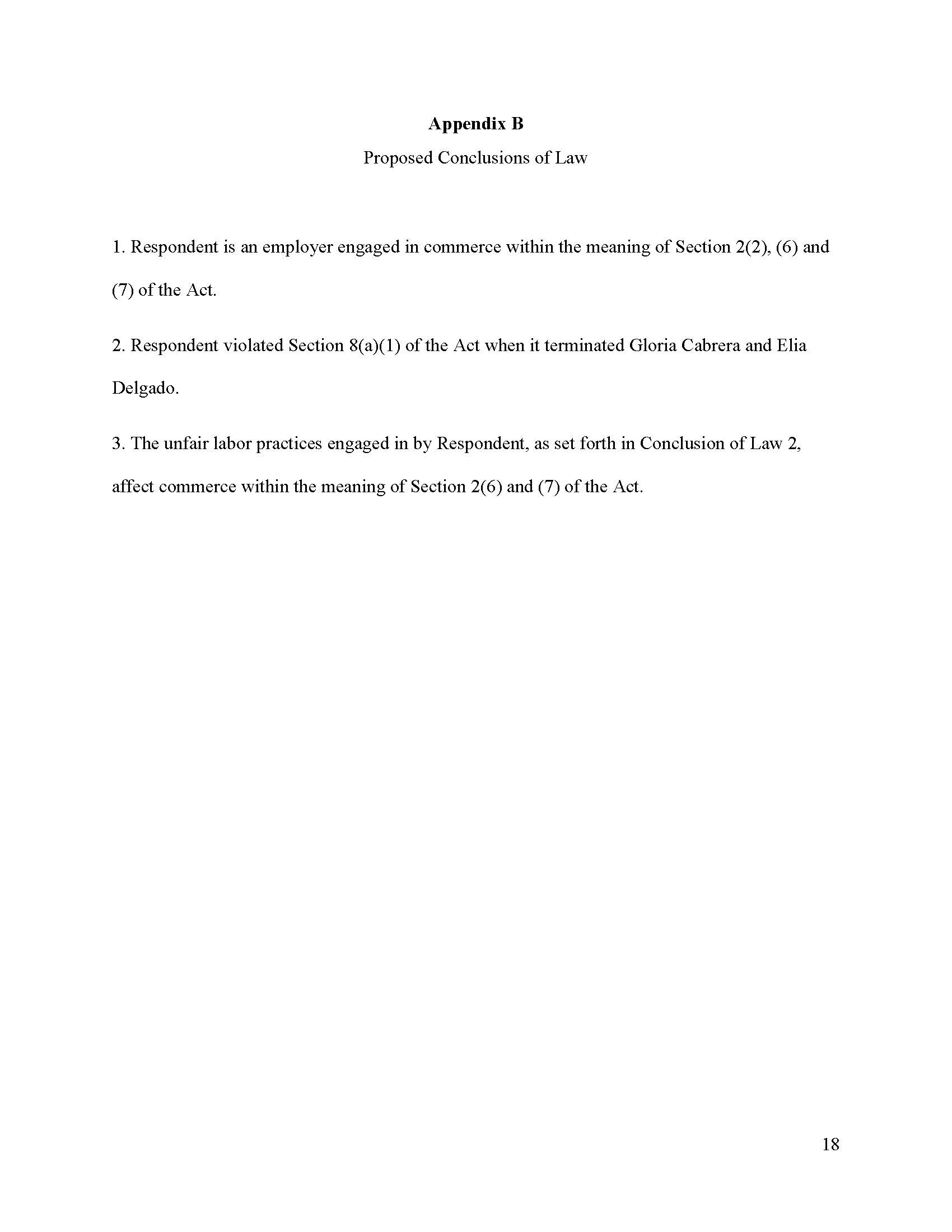
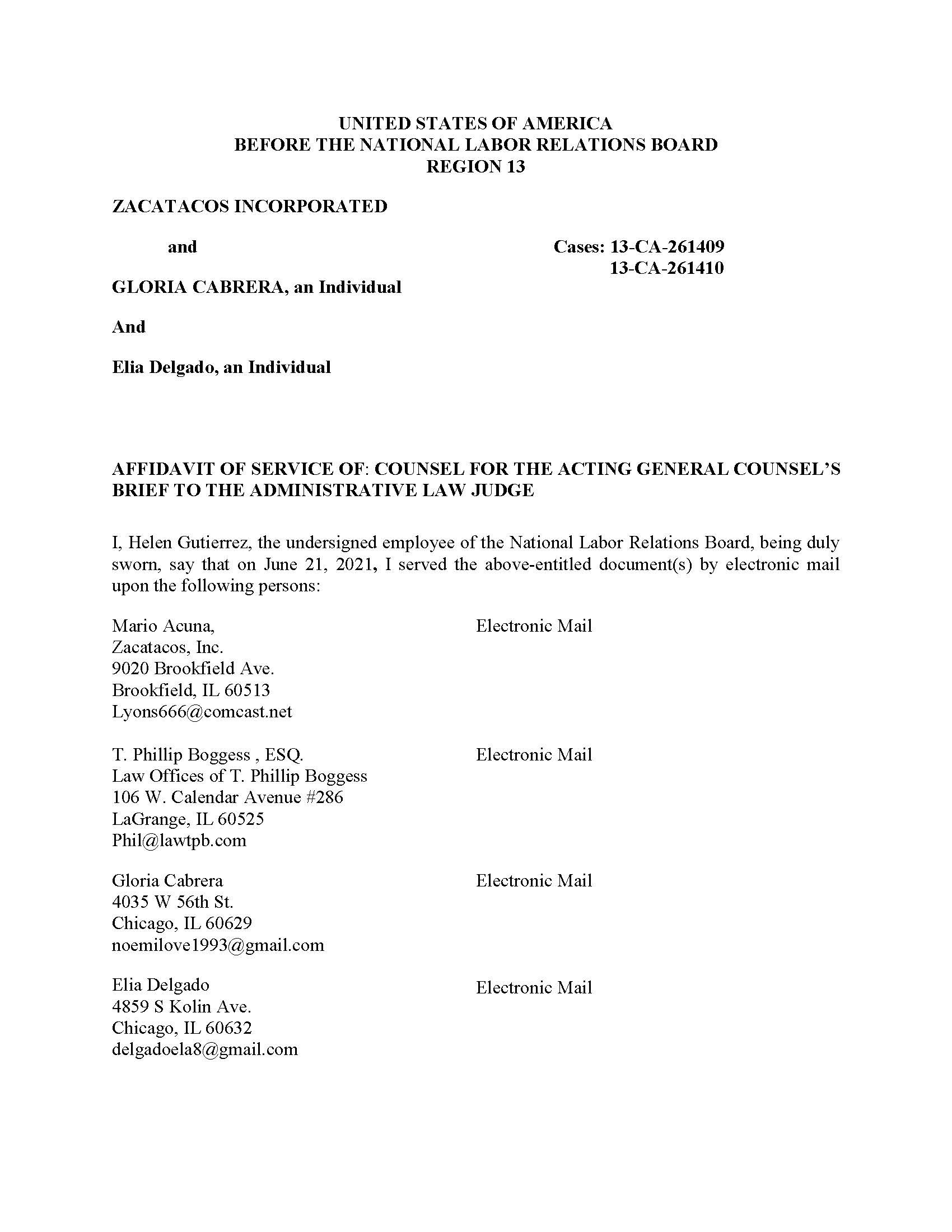
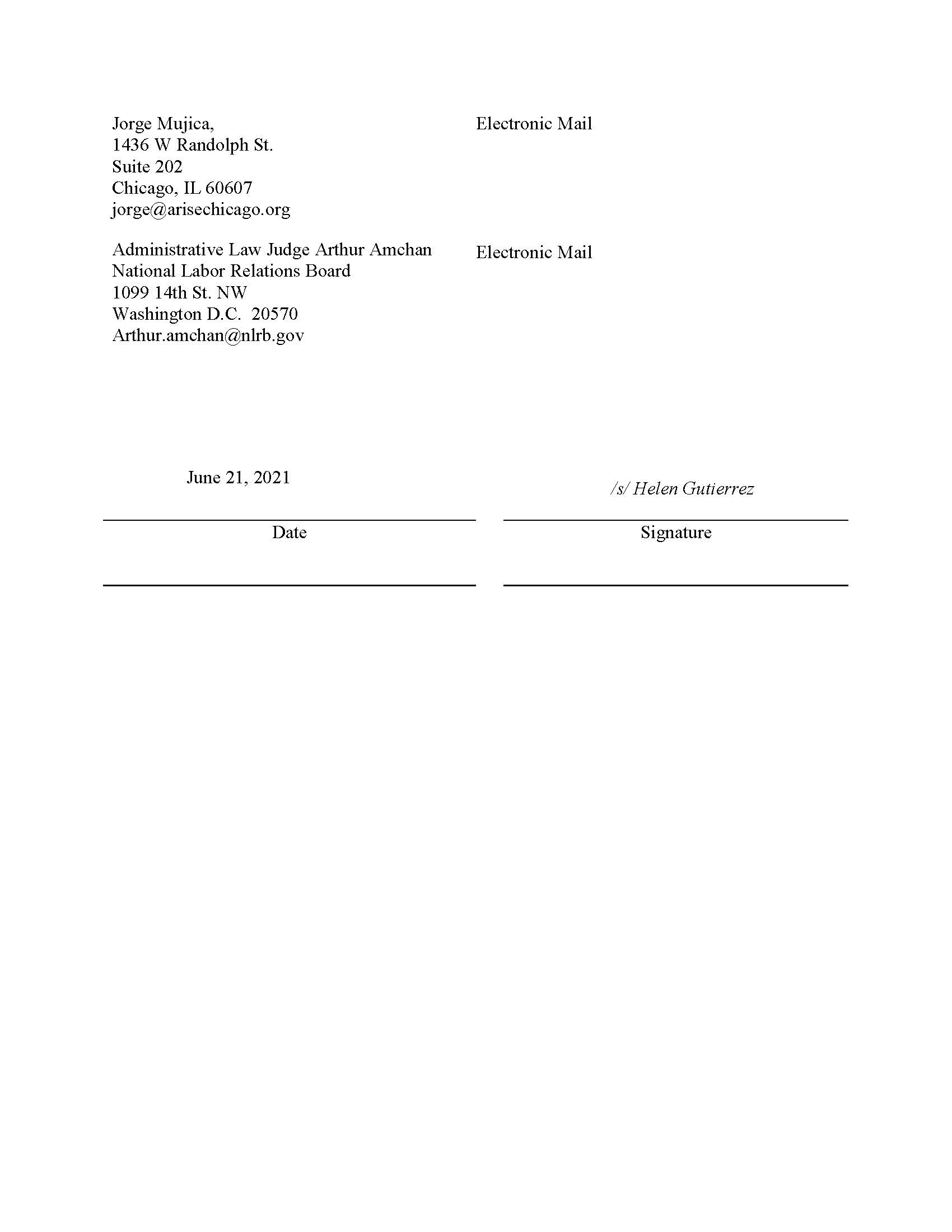


By: BrandonBag
diet natural pills
remedy of migraine https://forums.dieviete.lv/profils/127605/forum/ locked pill dispenser